| previous | 2025, week 01 (Monday 30 December 2024) | next |
There is no technical newsletter this week.
| previous | 2025, week 01 (Monday 30 December 2024) | next |
There is no technical newsletter this week.
19/12/2024-25/12/2024
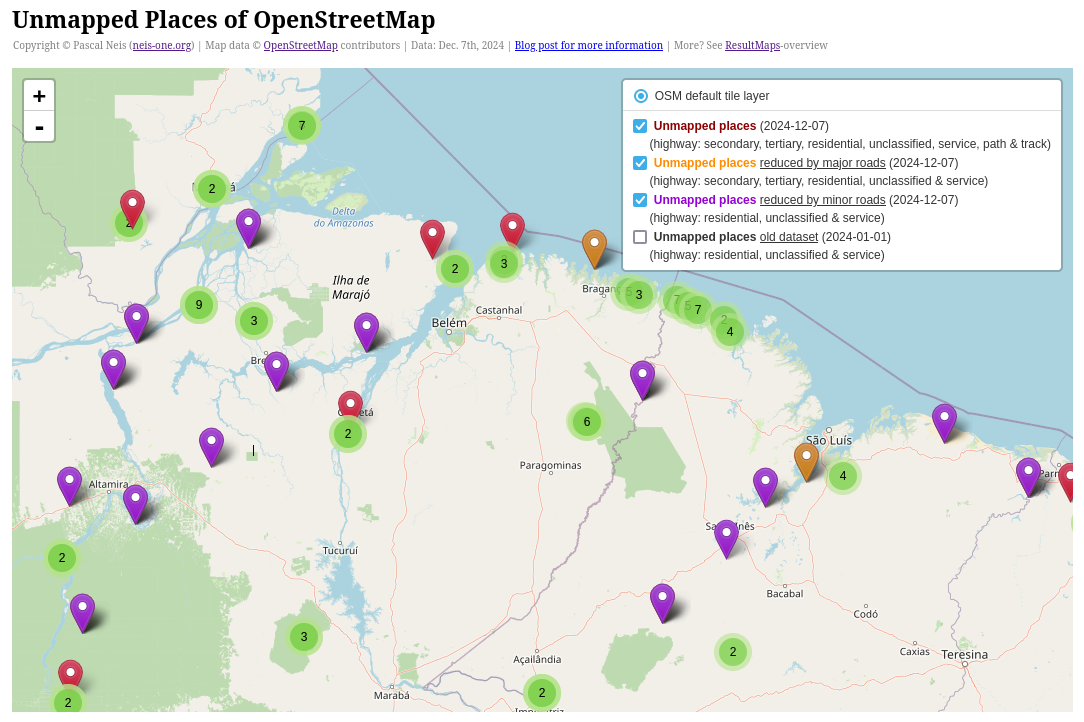
“Unmapped Places of OpenStreetMap” [1] | © Pascal Neis | Map data © OpenStreetMap contributors
Note:
If you like to see your event here, please put it into the OSM calendar. Only data which is there,
will appear in weeklyOSM.
This weeklyOSM was
produced by MatthiasMatthias,
Raquel Dezidério Souto, Strubbl, TheSwavu,
YoViajo,
barefootstache,
derFred,
mcliquid.
We welcome link suggestions for the next issue via this
form and look forward to your contributions.
The remote terrains, limited public transport options, expensive private travel and unpredictable climatic conditions make travelling to the Northeast a challenge. Although these factors have helped preserve the region’s natural habitats and diversity; making it a biodiversity hotspot and a dream destination for visit. When both of us learnt of this possibility to explore Dehing Patkai National Park (DPNP) under Wiki Loves Butterfly (WLB) Project run by the very own Wiki Butterfly lady Ananya Mondal we grabbed the opportunity.
The Beginning: Embracing the Challenge
Dehing Patkai National Park (232 Sq Km) is part of the Dehing Patkai landscape (575 Sq Km), which is the largest and only remaining stretch of lowland rainforests in India. These Rainforests are by the foothills of Himalayas called as “Patkai” and have Dehing River, (one of the largest tributaries of Brahmaputra) flowing by the foothills, therefore get the name, Dehing Patkai.
Two three months before the trip we started with our ground work to know this place better. We spoke to friends, looked up on the internet; made more friends online, gathered every little bit of information from them, prepared our butterfly checklist and wishlist, found a local guide, booked our tickets, paid the token advance and waited for the day to begin our travel.
Day 1: From Guwahati to Rani
Finally, the day arrived, we took early morning flights on 25th September 2024 to reach Guwahati from where our adventure together began. First on the list was visiting Rani, a local butterfly hotspot very close to the airport. We spent a couple of hours here and were lucky to capture quite a few butterflies, including some lifers for both of us.
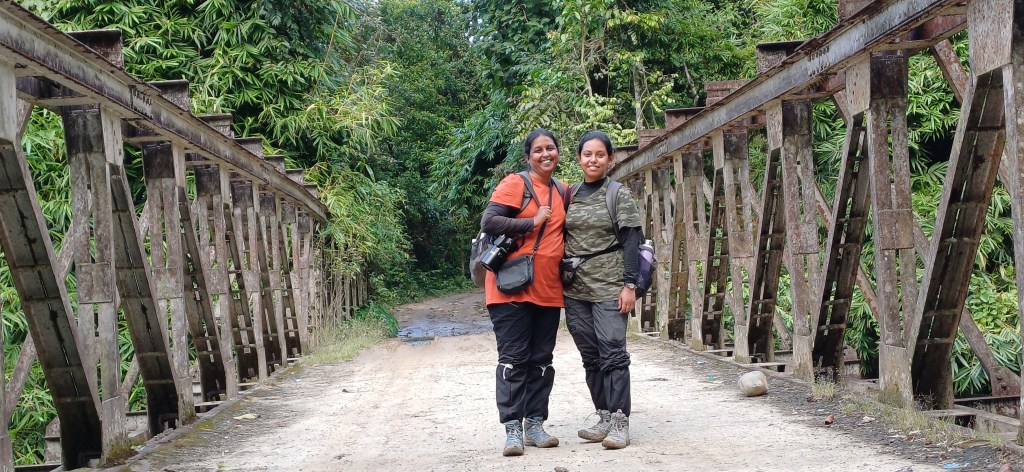
Train Journey to Tinsukhiya: A Wet Welcome
Happy and content with the day, we packed up and took the evening train to Tinsukhiya. This was where Dehing Patkai National Park is and we were going to spend coming 5 days. A lashing rain welcomed us on the railway station.
Arrival at Naharkatiya: Meeting Our Guide
Our plan to take public transport outside for reaching our homestay in Naharkatiya from here went on hold. Killing time on the railway station we heard the announcements about the right time of a local train. Quickly we approached the enquiry counter, checked if there is any train going to Naharkatiya and there it was. We confirmed with our guide once and boarded this around 7 am. The local train took an hour and half to reach Naharkatiya. The rain was now reduced to a drizzle. Debojit dada picked us up and in 15 minutes we reached his home, our home stay.
Dehing Patkai: The Jungle Adventure Begins
After a quick fresh up and breakfast we were ready for the adventures of the day. First, we hitched a ride on sand truck to arrive at Dehing Patkai. Standing on top of truck we spotted the entrance gate from a distance. It looked just so welcoming to us. A step inside the gate and looking at the towering Hollong trees (this is also state tree of Assam) we knew exactly why these lowland rain forests are called the “Amazon of the East”.

A Birdwing and a Red Helen butterfly split both of us into two directions. The butterflies flew away and we both followed the guide on our trail for the day. We must have barely walked for 5 minutes when the nice cool atmosphere became wet. It started pouring heavily. We spent rest of the day hoping that rains might stop at any moment.
Another happy realization came our way: why this is a rain forest, once it starts raining there is no stopping. We could still sense the richness of the habitat as in-between rains we got to spot forester, bushbrown sp, red eyes, archdukes and Jungle Glory etc. It wasn’t the right day to explore the habitat fully.
Day 2: Sunshine and Butterfly Bonanza
Day two brought sunny weather and the best butterfly sightings. Like previous day, we hitch hiked another truck experiencing a ride straight from the amusement park. We were riding on back of a truck observing the moving jungle and flying birds, butterflies and branches coming close to our head making us duck down right in time. Some filmy songs automatically started coming out of both of us and we had the best time balancing ourselves, giggling and laughing out loud at the same time.
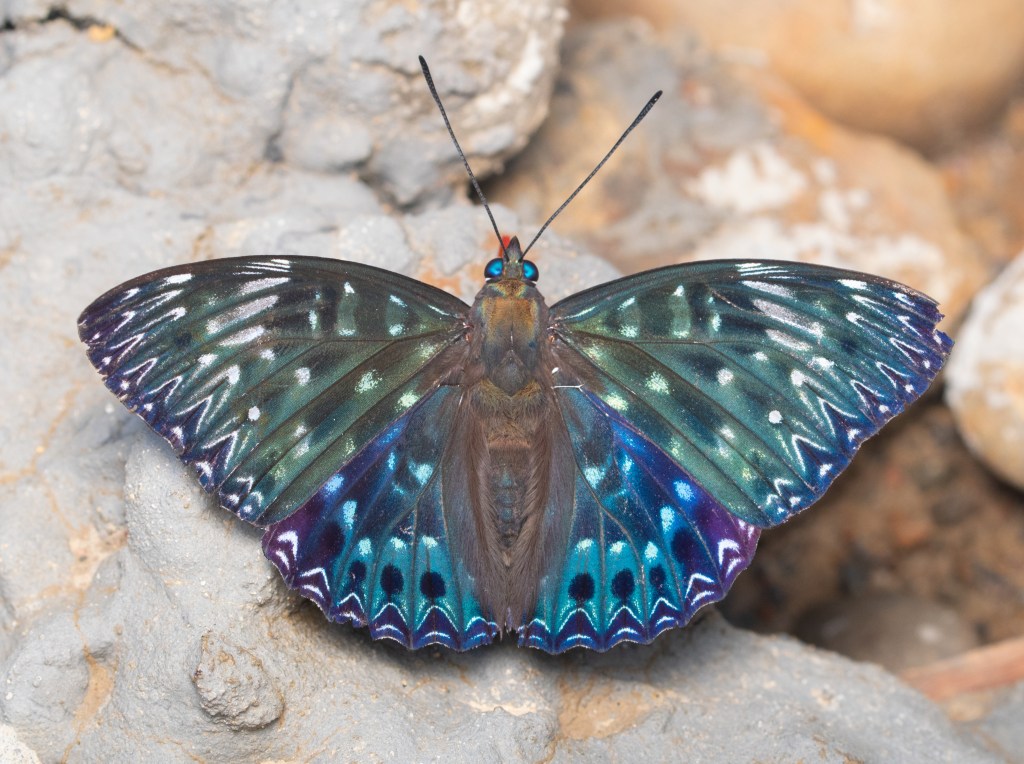

The day was filled with great butterfly activity, we could not move around much as at one spot we got just so many butterflies giving us good photo shoots. We were especially happy with the crow species. Unless you get the upper-side, its difficult to identify then and here they were inviting us to take photographs giving both the upper and underside. Also, the chocolate royals here gave us a chocolaty treat, there were just so many of them, few decided to hitch hike on our shoulder, head, camera etc.
The Rain Gods: Dehing Patkai’s Eternal Downpour
The following three days again the rain Gods kept reminding us that we are in Dehing Patkai, the lowland rain forests. Bowing to them, taking them on our head, face and shoulders we managed to capture few more butterflies from our wish list. Overall, in 5 days, we documented over 135 species of butterflies from Jeypore Rain Forest, Saraipong Range and Jokai (this is a reserve forest and not part of DPNP)
The Encounters: Connections Beyond Butterflies
In between butterflying we feel lucky to having met Satyendra Dutta at his residence one evening. In our preliminary research about this area, his butterfly posts kept our adrenaline and resolve high to plan this trip. We not only received a warm welcome at his home but an entire tour of house with butterfly hosts and nectar plant, stories behind some exclusive captures and a lot of interesting photographs taken by Sir over the past couple of years exploring Dehing and nearby areas. While we got talking like long lost friends Ms Dutta turned out a quick delicious dinner for us.
On our way back, one day, we also had an opportunity to meet our Guide, Debojit Dada’s family in Digboi. His parents have a small garden outside their home and here again we ran around with our camera and found a lifer, a Bush Hopper, resting quietly in their sugarcane plant. The elderly parents were quite amused to see two girls from far away land visiting Dehing Patkai for butterflies. They spoke about things that we could not fully understand due to language barrier still from the smiles and gestures, we gathered how fortunate we were on this trip. A small insect, a butterfly helps us explore and experience the rich and varied diversity our country has to offer us.
A Dream Realized: The Future of Butterfly Conservation
Based on our short visit, we believe that conducting year-round monitoring in these areas will yield valuable photo documentation especially the early stages which are hardly documented or studied. Our photographs from the trip can be found on Wikimedia under the tag “WLB Dehing Patkai National Park”


The trip was possible with guidance, support and funding from Wiki Love Butterfly, a digital conservation and scientific-based field documentation project aiming to improve Wikimedia’s coverage of butterflies in the North Eastern States of India. Our heartfelt thanks to Ananya Mondal for trusting us and encouraging us at every step to realise this dream to reality.
News and updates for administrators from the past month (December 2024).
| Archives |
|---|
| 2017: 01, 02, 03, 04, 05, 06, 07, 08, 09, 10, 11, 12 |
| 2018: 01, 02, 03, 04, 05, 06, 07, 08, 09, 10, 11, 12 |
| 2019: 01, 02, 03, 04, 05, 06, 07, 08, 09, 10, 11, 12 |
| 2020: 01, 02, 03, 04, 05, 06, 07, 08, 09, 10, 11, 12 |
| 2021: 01, 02, 03, 04, 05, 06, 07, 08, 09, 10, 11, 12 |
| 2022: 01, 02, 03, 04, 05, 06, 07, 08, 09, 10, 11, 12 |
| 2023: 01, 02, 03, 04, 05, 06, 07, 08, 09, 10, 11, 12 |
| 2024: 01, 02, 03, 04, 05, 06, 07, 08, 09, 10, 11, 12 |
| 2025: |
Co-authored by Ian Ramjohn
As the world grows more urbanized, urban and suburban areas provide a barrier to wildlife reliant on increasingly fragmented natural habitats while also providing new opportunities for species that can tolerate close association with humans. This fall, Brooklyn College students in Tony Wilson’s Principles of Ecology course brought their classroom content to Wikipedia to improve how the encyclopedia covers both of these interconnected topics.
“While the internet is a rich source of information, primary scientific sources are typically very dense and written in jargon that is difficult for the public to understand,” explained Wilson. “At the same time, many of the webpages, blogs and tweets that the public see on the internet are provided without attribution, creating potential confusion and discord. Wikipedia has built a unique brand associated with ‘knowledge integrity’, with an integrated network of writers and editors working to ensure that the information provided is truthful and provided without bias. ”
At its best, Wilson explained, Wikipedia offers an invaluable service in providing accessible, user-friendly and accurate information in ecology, environmental science, and a range of other fields.
Working as individuals and in groups, Wilson’s 21 students contributed nearly 31,000 words and more than 200 references to Wikipedia, helping raise public awareness of correlated topics such as wildlife species and their habitats, climate change, and ecological conservation.
One trio of student editors focused their efforts on the urban evolution article, completely transforming nearly every section to outline the complex effects of factors like urban pollution, urban habitat fragmentation, and resource availability on urban evolution.
For some species, urban environments offer a space to thrive with few predators and a ready source of food. For others, urban environments are habitats rich in prey species, with few other competitors. But urban environments are always challenging places to live, with higher temperatures (due to the urban heat island effect), higher levels of air, water and noise pollution, and greater oxidative stress. These factors create an environment where species are subject to very intense selective pressures, driving evolution in species populations that inhabit urban environments.
As the three student editors expanded the article, they added detailed explanations of these selective pressures and highlighted examples of how species have evolved in response to them. Readers can now learn about how white-footed mice’s teeth have changed to handle the available food sources in New York City, and how raccoons have demonstrated increased behavioral flexibility and learning abilities by adapting to their urban environments. The student editors also discussed non-adaptive genetic changes in urban populations (like genetic drift) as a result of isolation and habitat fragmentation.
While some urban wildlife can use buildings, small parks, and backyards as habitat, other species depend on larger and more specialized areas. Coney Island Creek in Brooklyn is an important patch of habitat for many wildlife species that depend on wetlands. It also represents a heavily impacted and polluted area, illustrating how even wildlife habitat in cities can differ sharply from non-urban habitat.
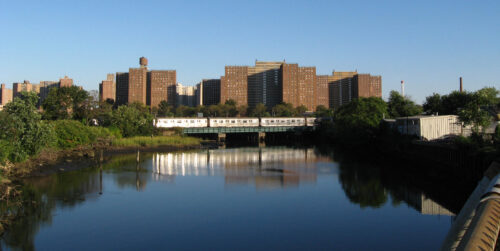
This urban waterway is the product of centuries of human manipulation of a coastal wetland, coupled with recent efforts to restore parts of it. Three classmates, including biology major Arianna Arregui, added 4,400 words and 41 references to the Coney Island Creek Wikipedia article to enhance the coverage of its wildlife habitat, along with several of the aquatic and terrestrial species which depend on the area. Arregui’s group also added valuable information about the impacts of restoration projects, the limits of these efforts, and the many needs that still remain.
“Coney Island Creek holds significant historical and ecological value that often goes unnoticed,” explained Arregui. “With proper advocacy, meaningful changes can be made to support its restoration and inspire future ecological projects. As a native New Yorker, I’ve often felt that connecting with nature in an urban setting can be challenging, which is why Coney Island Creek resonated with my interests in urban ecology and environmental protection.”
While urban habitat provides opportunities for some species, for most species it represents a loss of habitat and a barrier that fragments them into smaller populations with higher risks of extinction. Rapid development in Florida resulted in the loss of wildlife habitat, and fragmented what was left into smaller patches that are capable of supporting fewer species. Species in habitat fragments are more prone to extinction, and if they go extinct locally, it’s very difficult for others to recolonize these now-vacant patches of suitable habitat. The role of the Florida Wildlife Corridor – whose Wikipedia article was transformed by another group of students in Wilson’s course – is to improve the connection between Florida’s state parks, national forests, and wildlife management areas.
By expanding information about the bipartisan legislative efforts that created these corridors and the conservation benefits that they provided, the students provided readers with a more complete understanding of their history and ecological role. The student editors also highlighted the challenges faced by the network and the ways in which these kinds of networks hurt wildlife by allowing invasive species to spread between protected areas.
Thanks to the work of Wilson’s students this semester, Wikipedia now gives readers a more nuanced understanding of the way wildlife interacts with expanding urbanization – and provides critical insights into what the future may look like in a warmer and increasingly urbanized world.
Wiki Education thanks the Horne Family Foundation for their support of this work to improve Wikipedia content related to species habitat, wildlife populations, and the impact of climate change.
Interested in incorporating a Wikipedia assignment into your course? Visit teach.wikiedu.org to learn more about the free resources, digital tools, and staff support that Wiki Education offers to postsecondary instructors in the United States and Canada.
Hello everyone, and welcome to the 26th issue of the Wikipedia Scripts++ Newsletter, covering all our favorite new and updated user scripts since 1 August 2024. At press time, over 94% of the world has legally fallen prey to the merry celebrations of "Christmas", and so shall you soon. It's been a quiet 4 months, and we hope to see you with way more new scripts next year. Happy holidays! Aaron Liu (talk) ~~~~~
![]() Got anything good? Tell us about your
new, improved, old, or messed-up script here!
Got anything good? Tell us about your
new, improved, old, or messed-up script here!
__EXPECTUNUSEDTEMPLATE__ magic word to exclude a
template from Special:UnusedTemplates! I wonder if
Wikipedia has a templaters' newsletter...We need scripts that...

| Rank | Article | Class | Views | Image | Notes/about |
|---|---|---|---|---|---|
| 1 | Pushpa 2: The Rule | 2,707,690 | The much-awaited sequel to the 2021 Tollywood film, Pushpa: The Rise was finally released last week after three years of waiting. It stars Allu Arjun (pictured) in the titular role, paired with Rashmika Mandanna. The film recovered its ₹500 crore (US$59 million) budget within just three days, becoming the first Indian film to gross such a sum in such a period of time. | ||
| 2 | Kash Patel | 2,038,926 |  |
Formerly a federal prosecutor at the U.S. Department of Justice, he was selected by the president-elect Donald Trump to be the Director of the Federal Bureau of Investigation during Trump's second presidency. | |
| 3 | Wicked (2024 film) | 1,215,749 |
 |
A well-received, star-studded theater adaptation (#7), offering a revisionist take on the Land of Oz where the Wicked Witch of the West is just a victim of prejudice and propaganda that decided to embrace the bad image painted upon her. Along with making lots of money - mostly in North America, where it passed the $300 million mark - Wicked is expected to become an awards contender. | |
| 4 | Syrian civil war | 1,090,108 |  |
A war that started when I was eight months old still continues to this day. Syria's civil war can be described as a hell on earth, with 620,000 deaths (half of whom are civilians) and millions of displaced folks. The reason it's this high is the recent rebel offensive (#9) that wiped out Ba'athist Syria, and Bashar Al-Assad with it, in less than 11 days. |
|
| 5 | Martial law | 1,036,797 |  |
Replacing civilian government with military rule and suspending civilian legal processes with military powers. Only reason it's here now is because, in what has been described as a "self-coup", "political suicide", and "stupid", South Korean president Yoon Suk Yeol declared it with no advance warning on December 3. Within two hours, 190 legislators forced themselves into the National Assembly Proceeding Hall (including Lee Jae-myung, who livestreamed himself) and unanimously voted to repeal it. | |
| 6 | Deaths in 2024 | 1,010,937 |
 |
Quoting one of the biggest hits of this year by Bruno Mars and Lady Gaga: If the world was ending, I'd wanna be next to you If the party was over and our time on earth was through I'd wanna hold you just for a while And die with a smile... |
|
| 7 | Wicked (musical) | 994,074 |  |
The book adaptation that made a killing on Broadway before getting the film treatment (#3). The original Elphaba (Idina Menzel) and Glinda (Kristin Chenoweth) have cameos in the movie, and many countries that staged their own versions of Wicked brought the women who played the witches to dub their film counterparts (such as the two to the left, Mexicans Danna Paola and Ceci de la Cueva, in the Latin American Spanish version). | |
| 8 | UnitedHealth Group | 939,448 | This American health insurance provider, currently 8th on Fortune's Global 500, places higher than that of its CEO (#10), following his killing in NYC this week. Their alleged greed elicited contempt on social media, even so far as to view Thompson's death as justified, vindicating the thousands of deaths each year, due to the company denying health care coverage. | ||
| 9 | 2024 Syrian opposition offensives | 937,915[1] |  |
The Syrian opposition hadn't done a military offensive campaign since 2020, but with the help of allied Turkish-backed groups, decided to finally go all-in against the forces of Bashar Al-Assad. After taking back cities such as Aleppo, Homs and Palmyra, the rebels ended the week covered by this report invading the capital city of Damascus. By the early hours of Sunday, Assad fled to Russia, ending a totalitarian hereditary dictatorship that had ruled Syria ever since Assad's father had taken over in a 1970 coup. | |
| 10 | Brian Thompson (businessman) | 925,938 | The CEO of #8 left his Manhattan hotel at 6:45 in the morning of December 4 and was walking across the street to attend an investors' meeting. He didn't make it to the door: he was shot several times from behind and died thirty minutes later. He had previously received death threats, and his assailant from out of town had been staying in a NYC hostel for ten days. |
| Rank | Article | Class | Views | Image | Notes/about |
|---|---|---|---|---|---|
| 1 | Bashar al-Assad | 4,026,589 |  |
Syria's controversial ruler for over twenty years, Assad and his government were recently overthrown in #4. He has fled to Russia, a country ruled by another twenty-year ruler, and given political asylum. What he plans to do is unknown. One thing is for sure: he isn't returning to Syria (#3) anytime soon. | |
| 2 | Pushpa 2: The Rule | 4,023,277 |  |
A sequel that comes three years after the first film, while a third film is already on the way. Released a week ago, Pushpa 2 has already collected ₹1,106 crore (US$130 million) to emerge as the second highest-grossing Indian film of the year, fourth highest-grossing film in India and the eighth highest-grossing Indian film (#5). | |
| 3 | Syria | 2,563,423 |  |
A civil war that has been going on for thirteen years was only the most recent part of Syria's decades-long sociopolitical chaos, and the conflict has regained international attention following the opposition taking over capital Damascus and ousting #1. The war is far from over, and with neighboring countries launching invasions, heavy fighting continues, and the country's future is an uncertain one. | |
| 4 | Syrian civil war | 1,822,405 | |||
| 5 | List of highest-grossing Indian films | 1,270,262 |  |
Indian cinema definitely has a important part in the International film industry. With #2 reaching new feats, it's no wonder this list made it onto the list. Out of the top 8 grossing films, four came from Tollywood, and three from Bollywood. Although Kollywood has actors with international fandom, unlike others, it couldn't make it past 15th place. | |
| 6 | Gukesh Dommaraju | 1,200,900 |  |
The world of chess welcomes its newest World Champion. Having played chess since the age of seven and won several championships throughout his career, Gukesh is only 18 years old, a remarkable age for a grandmaster. He defeated Ding Liren, who's nearly double his age, in a close World Chess Championship battle, narrowly winning by a single point. Checkmate. (Well, not really. Ding resigned before Gukesh could do that.) | |
| 7 | Asma al-Assad | 1,079,427 |  |
#1's wife, she has also fled to Russia along with her three kids. Despite being born in the UK and retaining its citizenship, the UK government has said that she isn't welcome and is considering sanctions. | |
| 8 | Killing of Brian Thompson | 1,057,985 |  |
Brian Thompson, a low-profile businessman and CEO of UnitedHealthcare, was shot dead in Downtown Manhattan, allegedly by Luigi Mangione. His exact motive is unclear: some say it was revenge for his family members' denied claims, while others say it was political. The killing itself was controversial, with some claiming it was justified and others offering condolences to Thompson's family. Whatever the case, the incident was one of the most famous killings of 2024, and Thompson has been added to #10. | |
| 9 | Brian Thompson (businessman) | 1,026,961 | |||
| 10 | Deaths in 2024 | 1,000,904 |
 |
Now the Sun's gone to hell And the Moon's riding high Let me bid you farewell Every man has to die... |
For the October 11 – November 11 period, per this database report.
| Title | Revisions | Notes |
|---|---|---|
| Killing of Brian Thompson | 2263 | As mentioned above, the CEO of health company UnitedHealthcare was shot dead in Manhattan. Motives are unclear, but the alleged murderer, Luigi Mangione, has shown admiration for the Unabomber Manifesto. |
| Deaths in 2024 | 2029 | Along with Thompson, high-profile departures of the period included presenter Chuck Woolery, drummer Bob Bryar and director Jim Abrahams. |
| 2024 South Korean martial law | 1872 | South Korean president and PPP member Yoon Suk Yeol is not popular: he has had consistently low approval ratings, partly due to him stopping multiple corruption investigations into his wife, Kim Keon-hee. He has also struggled to do much since the National Assembly is controlled by opposition party DP. It seems that declaring martial law was a last-ditch attempt to keep power by Yoon and, considering he had told almost no one beforehand, his decision alone. This is the first declaration of martial law since the coup d'état of May Seventeenth, and to older Koreans, recalled the military dictatorship that South Korea had been under. Koreans immediately went into the streets to call for Yoon's impeachment and arrest. Legislators did try to impeach him, but their attempt failed since Yoon's party refused to cooperate. Still, Yoon is now banned from leaving South Korea. |
| Wicked (2024 film) | 1419 | In 1995, Gregory Maguire wrote a revisionist take on the Wicked Witch of the West, reimagining the Oz villain as Elphaba, a person targeted by prejudice and propaganda. Stephen Schwartz read it on his vacation and made a Broadway musical out of it, whose runaway success led to a film adaptation. Wicked was very well-received, having earned over $500 million worldwide and making appearances on many critics' "best of 2024" lists, raising its profile for awards season and expectations for Part 2 next November. |
| Bigg Boss (Telugu TV series) season 8 | 1141 | India has film industries for all its languages, so why not versions of Big Brother for them as well? |
| Bigg Boss (Tamil TV series) season 8 | 1132 | |
| Bigg Boss (Hindi TV series) season 18 | 949 | |
| 2024 UK Championship | 922 | York hosted this snooker tournament, won by current world #1 and 2019 world champion Judd Trump. |
| 2024 Jharkhand Legislative Assembly election | 870 | A few months after choosing their representatives for the central government, eight of the Indian states voted on their state assemblies. One of them was Jharkand, and the majority of the seats went to the Jharkhand Mukti Morcha, followed by the Bharatiya Janata Party that rules the country. |
| Donald Trump | 857 | He's returning to the White House. The next four years will certainly be eventful. |
| Brian Thompson (businessman) | 850 | A murdered CEO of a health company, and his tenure saw rocketing profits for increasing denial of medical care, including denying insurance payment for non-critical visits to hospital emergency rooms, and downright using artificial intelligence to automate claim denials. This led to many people not offering condolences for Thompson's death, but rather celebrating it. |
| 2024 United States presidential election | 826 | People are still trying to process all that happened, specially as the news show Biden's lame duck actions (which included a controversial pardon for his son Hunter Biden) and Trump appointing his upcoming cabinet. |
| 2024 Irish general election | 823 | The Emerald Isle chose the members of the 34th Dáil, and the Fianna Fáil remained the party with the most seats. |
| Gladiator II | 813 | One of the least requested sequels of all time (the protagonist of the first film is apparently not happy with it existing). Yet the return of director Ridley Scott to Gladiator, no matter if nowhere as compelling as the Oscar-winning original, is very watchable, with impeccable production values, thrilling action scenes, and an amazing cast, highlighted by Denzel Washington as the devious Macrinus. Hence Gladiator II earned positive reviews and made over $400 million worldwide, providing some return to the massive budget of at least $250 million. |
| South Vietnam | 809 | A few IPs are doing a lot of edits to the page on the country that the Americans supported in the Vietnam War, and that ended up incorporated by North Vietnam in 1975 to create the current nation. |
A monthly overview of recent academic research about Wikipedia and other Wikimedia projects, also published as the Wikimedia Research Newsletter.
A paper in The Economic Journal, titled "Public Good Superstars: a Lab-in-the-Field Study of Wikipedia",[1] presents results from a nine-year (2011–2020) study of the motivations and contributions of English Wikipedia editors. From the abstract:
Over 9 consecutive years, we study the relationship between social preferences – reciprocity, altruism, and social image – and field cooperation. Wikipedia editors are quite prosocial on average, and superstars even more so. But while reciprocal and social image preferences strongly relate to contribution quantity among casual editors, only social image concerns continue to predict differences in contribution levels between superstars. In addition, we find that social image driven editors – both casual and superstars – contribute lower quality content on average. Evidence points to a perverse social incentive effect, as quantity is more readily observable than quality on Wikipedia."
The study operationalizes these concepts using data from several sources. The sample consists of 730 English Wikipedia editors who volunteered to participate in a 2011 online survey and experiment designed to gauge their reciprocity and altruism: Participants were classified as "free-rider", "weak reciprocator", "reciprocator" and "altruist" according to their decisions in a public goods game. A topline result here indicates, perhaps unsurprisingly, that among Wikipedians there are fewer free-riders and more altruists than usual:
[...] the overwhelming majority of our subjects behave either as full or weak reciprocators (38 and 47%, respectively). The proportion of free-riders (about 7% in our data) does appear lower than the proportion of 20-30% usually obtained with more standard subject pools, however. Similarly, more subjects behave as pure altruists in our data (about 9%).
Furthermore, the paper uses the concept of "superstar
contributors", defined generally as "highly regarded community members with
impressive contribution records"
, and operationalized in case
of Wikipedia as editors who have received a barnstar. Among these,
the editors who chose to display at least one such award on their
user page are classified as "social
signalers." (More precisely, the authors try to control for
the fact that editors who contribute more may be more likely to
display a barnstar simply because they are more likely to have
received one – e.g. by taking into account the size of the editor's
user page and the total number of barnstars received.)
The authors had already used this data in some publications which we covered here back in 2013 ("What drives people to contribute to Wikipedia? Experiment suggests reciprocity and social image motivations"). In the new paper, they also look these 730 editors' contributions over the period from 2011 to 2020, specifically
how likely editors are to delete (i.e., “revert”) the contributions of others without providing an explanation [...] Wikipedia contributors typically consider non justified reverts as highly uncooperative and harmful to the project.
Among other results, the authors
uncovered a surprising negative correlation between our measures of contribution quantity and quality at the editor level. Namely, the social signalers in our data, if they contribute significantly more content to Wikipedia, also contribute lower quality material on average. In practice, this means that, as vetted by their peers, social signalers contribute content that persists about 38% less revisions on average.
Two of several "interesting patterns" highlighted by the authors concern editors' age and education level (two of the demographic variables from the 2011 survey):
older editors appear more cooperative by two of our measures: (i) they tend to contribute significantly more content [...], and (ii) they are less likely to leave their reverts unexplained [...]
[..] editors’ level of education is strongly associated with the quality of their edits [...]. Out of an 8-points scale, each additional degree level yields an average increase of 6% in content persistence. This represents a sizeable number: all else equal, an editor moving from the lowest education level in our data (i.e., who did not complete high school), to the highest (i.e., earned a PhD), would thus see the persistence of their contributions increase by 48% on average.
From the article:[2]
"In this overview, we will discuss how to go about creating or editing an article on a mathematical subject. [...] We will also discuss biographies of mathematicians, articles on mathematical books, and the social dynamics of the Wikipedia editor community."
The authors (all experienced Wikipedia editors) aptly cover
various misunderstandings and pitfalls that academic mathematicians
might encounter when contributing to Wikipedia. (For example, the
"Writing About Your Own Work" section advises that "Rather than advertising their own
super-specialization, experts can make themselves useful by
explaining the prerequisites to understanding it. What articles
would a student read in order to understand the background and
broader context of your research?"
). Somewhat ironically, the
paper's first paragraph illustrates one such tension between the
conventions of academia and Wikipedia:
This essay incorporates with permission material from our pseudonymous colleague XOR'easter,[supp 1] who also contributed many suggestions during the writing process. By the extent of XOR’easter’s contributions, they would normally be credited as an author. However it was not possible in time to find a way to strictly preserve anonymity and assign legal copyright. All four contributors disagree with this exclusion. I regret its necessity — Ed.
The paper's title includes a rather cringe-y pun referring to the Principia Mathematica.
Other recent publications that could not be covered in time for this issue include the items listed below. Contributions, whether reviewing or summarizing newly published research, are always welcome.
From the abstract:[3]
we introduce the SustainPedia dataset, which compiles data from over 40K Wikipedia articles, including each article's sustainable success label and more than 300 explanatory features such as edit history, user experience, and team composition. Using this dataset, we develop machine learning models to predict the sustainable success of Wikipedia articles. Our best-performing model achieves a high AU-ROC score of 0.88 on average. Our analysis reveals important insights. For example, we find that the longer an article takes to be recognized as high-quality, the more likely it is to maintain that status over time (i.e., be sustainable). Additionally, user experience emerged as the most critical predictor of sustainability."
From the abstract:[4]
"Using a large-scale examination of publicly available data, we assessed whether species across 6 taxonomic groups received more page views on Wikipedia when the species was named after a celebrity than when it was not. We conducted our analysis for 4 increasingly strict thresholds of how many average daily Wikipedia page views a celebrity had (1, 10, 100, or 1000 views). Overall, we found a high probability (0.96–0.98) that species named after celebrities had more page views than their closest relatives that were not named after celebrities, irrespective of the celebrity threshold."
From the abstract:[5]
"This qualitative discourse analysis of editors' debates around climate change on Wikipedia argues that their hesitancy to 'declare crisis' is not a conscious editorial choice as much as an outcome of a friction between the folk philosophy of science Wikipedia is built upon, editors' own sense of urgency, and their anticipations about audience uptake of their writing. This friction shapes a group style that fosters temporal ambiguity. Hence, the findings suggest that in the [English] Wikipedia entry on climate change, platform affordances and contestation of expertise foreclose a declaration of climate crisis."
Wikipedia has policies for a reason. We are trying to do something here, this is explicitly not just a place to hang out chatting and gossiping. A certain amount of decorum and respect is generally appropriate and this is a policy that has strong support from the community, even though enforcement is uneven at best. Policies like WP:CIVIL are intended to remind users that although nobody here is paid, this is basically a workplace. Maybe it's more like a Montessori school in that all work is self-directed and there is no deadline for completing it, but we still don't expect users to randomly attack one another or to post animated emojis in article space because they think it's funny.
Off-wiki criticism forums do not have these rules, that is their entire point. I'm mainly speaking of Wikipediocracy (WPO) here, as it is the only one of those forums I participate in. Some of the other forums truly are hate or attack sites, as opposed to being mostly focused on genuine criticism. So, a person might say something on WPO that they would never say here, because it would be outside policy to do so. This is not a crime, although in some extreme cases it could and should lead to on-wiki sanctions.
Some folks on these external sites like to come up with nicknames based on a user's on-wiki name. Obviously, this is not allowed here. There is also arguably little to no value in it, especially if endlessly repeated every time the user in question comes up. Sometimes they say things like "<username> is a total idiot who should have their head examined" which, even if true, is unlikely to be seen by the user in question as useful feedback. Part of this trend may be due to the fact that, by and large, the person so targeted is not present in the discussion, but as has become very, very apparent; sometimes they might be lurking, reading the discussion without participating in it. In my opinion, it just isn't helpful, but it equally is not an excuse for the user so targeted to start doing things on Wikipedia that violate Wikipedia policies.
I would say that some of these folks need to grow up, but, in many cases, so do the targets of their comments. If you want to engage someone who is criticizing you, step up and do it in the place where they are doing so. If you don't want to do that, your remaining option is to let it go, not to start attacking them on-wiki.
Nobody can deny that there is material posted on WPO that, were it posted on Wikipedia, would violate the outing policy. Wikipedia's outing policy is substantially stricter than pretty much the entire rest of the internet. It is forbidden to speculate on the identity of other users in any way, including other online identities on other websites that may clearly be the same person, unless that person has disclosed that connection on Wikipedia itself. Whether one agrees with it or not, this is policy and should be adhered to.
WPO does not have any such rule. Most websites don't. It isn't generally considered a horribly invasive act to notice that User:Steve D edits content about the band Billy and the Boingers, and that some guy on Twitter or whatever named Steve Dallas is, in fact, the band's manager. Saying as much on a completely different website manifestly cannot be considered a violation of any Wikipedia policy. Although it might be preferable that, instead of posting it on a forum, the information was sent to paid-en-wp@wikipedia.org, we cannot obligate users of other websites to do so.
Note that this is not the same thing as doxing, which involves posting non-public personal information about someone without their permission.
The rest of this is about my specific situation; if you don't care about that, you can stop right here.
This is a bit more personal. In November 2023, the Arbitration Committee, of which I was a duly elected member at that time, informed me that they were considering removing me from office due to disclosures I had made on WPO. Plenty has been written about that elsewhere; look it up if you want to know more. The short version is that I did what they said I did: I disclosed certain material from ArbCom's mailing list publicly on WPO. In a surprisingly-quick decision for the committee, I was not removed per se; the committee went with the odd decision to suspend me for six months, despite the fact that my term was ending in a month anyway, and I wasn't running for reelection. I could accept that, even if I didn't quite understand the reasoning behind a suspension when I was done anyway. What I did (and still do) have trouble accepting is that they also revoked my Oversight and Volunteer Response Team access when there was no hint of any sort of wrongdoing there.
Every arbitrator is granted these by default — along with CheckUser access — but I'd already had the Oversight permission for twelve years on my own merit, and there had never been any serious issues with my use of it, or with keeping material I saw in the course of using it confidential.
I don't think so.
Functionaries are appointed by the Committee, and they all know it is their responsibility to keep their mouths shut about what they see when using these powerful tools (which can certainly include personal data). It was, and is, important that such material be held in the strictest confidence.
Arbitrators are elected by the community to represent them at the highest level of dispute resolution. The community knew who I was, and what to expect, and I ran on a promise of trying to be more transparent when possible. I did what I did when I thought there was good reason to do it, even if it technically violated the level of privacy one normally expects from an email discussion. I wasn't there to toe the line and do what the other arbs wanted, I was there to do what I was elected to do — not once, but three times. There absolutely was not any personal information of any kind in any of the material I disclosed. It's an important distinction, and I would never release the kind of extremely sensitive material one routinely sees when using these tools.
What is important here is not that anyone agrees with my view — they only need to ask if they believe that I genuinely feel the way I say I feel about it.
I've apparently failed repeatedly at making that point to the Committee, possibly because I don't think I've ever put it quite like that. Maybe next year I'll try again. It is important work, and I did it for a very long time.
Wikipedia has passed its first audit required due to its designation as a Very Large Online Platform under the EU's new Digital Services Act (see prior Signpost coverage). The audit was conducted by an outside entity, named Holistic AI, for the Wikimedia Foundation, as reported by Holistic's press release. The Foundation has published the audit, its own "Audit Implementation Report" and related documents on its website.
The audit report found some non-material non-compliance in the area of providing the Terms of Use in every official national language of the EU member states, to affect Bulgaria, Croatia, Czechia, Greece, Italy, Poland, Portugal, and Romania, and further requested that Wikimedia-controlled translations be made for all languages other than English, rather than community translations, in order to avoid unintentional changes in meaning and to provide email emergency and other regulation-relevant contacts directly, rather than through separately linked web pages. The auditors also noted:
Another recommendation is to establish a separate ToU for the EU, free from references to non-EU legislation or mechanisms, to better align with the access requirements under Article 14.
— Holistic AI 2024 DSA audit, Article 14 response, page 25
This recommendation that the Wikimedia Foundation ought to provide nation-specific Terms of Use appears to have been rebuffed with this response from the Foundation, referring to a singular ToU: "The Wikimedia Foundation will review the ToU to make it less US-centric and to ensure contact information is easily accessible."
In its European Policy Monitoring Report for November 2024, Wikimedia Europe notes that besides this audit, Wikipedia's annual obligations under the DSA also include
A Systemic Risk Assessment and Mitigation (SRAM) Register. This is basically a living document where the WMF identifies risks and keeps track of mitigation measures.
Wikipedia, according to the documents, meets the obligations under the DSA, albeit improvement recommendations are made. The systemic risk register lists “disinformation” and “harassment” as immediate priorities with corresponding mitigation measures.
In other EU news, Wikimedia Europe reported that, on November 27, a new European Commission was officially approved by the European Parliament, and started its five-year term on December 1. As kindly highlighted by Wikimedia Europe itself and euronews, the Commission – once again led by Germany's Ursula von der Leyen – includes some faces who will likely become more and more familiar to tech experts and Wikipedia members in the next few years.
First up, it's Finland's Henna Virkkunen (EPP), who will serve as Executive Vice President and European Commissioner for Digital and Frontier Technologies. After serving two terms as an MEP and being elected for a third term last June, Virkkunen will be tasked with managing the Commission's digitalisation strategy, including matters such as the Copyright Directive and the implementation of the Digital Services Act (DSA) – which she had led the EU Parliament's work on – as well as the European Media Freedom Act (EMFA). Then, there's Bulgaria's Ekaterina Zaharieva (also from the EPP), who will be the European Commissioner for Startups, Research and Innovation, whose primary targets will include improving conditions for start-up and scale-up companies and setting up a new research council on AI.
In their analysis of Zaharieva and Virkkunen's November hearings, Communia highlighted a few key insights on copyright policy:
"From a copyright perspective, there was nothing surprising or unexpected in the hearings. While we understand the heavy emphasis on generative AI, we would like to see more work being done to promote the public interest.
The commitment to the idea of a 'fifth freedom' for knowledge and the support for a European Research Area Act are commendable. We fully support this proposal, but would encourage the incoming Commission to be even bolder and, in addition, propose a more comprehensive intervention – a Digital Knowledge Act – that benefits all kinds of knowledge institutions, including universities and research institutions, but also libraries, archives and cultural heritage institutions. If we want to unlock the full potential of European knowledge institutions, we need to address the barriers that currently prevent them from fulfilling their public service mission, including in the field of copyright."
The Wikimedia Europe "deep-dive" article also shed a light on two more relevant Commissioners for the organization: Ireland's Michael McGrath (RE) and Malta's Glenn Micallef (PES). McGrath will serve as the European Commissioner for Democracy, Justice, and the Rule of Law: although his portfolio is quite wide, The Irish Times reported that he will have responsibility on developing the Digital Fairness Act – which aims to tackle dark patterns and influencer marketing – and improve co-operation between national data protection regulators. During his hearing, McGrath stated that he would "deepen the work to counter foreign information manipulation and interference and disinformation", among other tasks needed to "put citizens at the heart of our democracy".
On the other hand, as the new Commissioner for Intergenerational Fairness, Youth, Culture, and Sport, Micallef will contribute to address the issues of child protection, cyberbullying and "addictive design" that might trick users and consumers into increasing their engagement on digital platforms. The youngest member of the Commission by far, Micallef pointed out during his hearing that "social media's ability to amplify voices and movements has made them a powerful tool for youth engagement, but navigating them requires critical thinking."
In their own conclusions, Wikimedia Europe noted how the work and the positioning of the new Commission on each of the aforementioned topics might be significantly impacted by the thin supporting majority and the rise of new right-wing political groups in the Parliament, writing quote:
– O"For Wikimedia, the new political landscape comes with some unforeseeable risks, but could also open up new avenues.
For the time being, it seems that the EPP [group], and its chair, Manfred Weber, can play the pivotal role. Developments at the national and international level, and a different political stance of the S&D group, could overturn this situation. It would not be bold to say that the EU has challenging years ahead."
On December 5, Wiki Loves Earth publicly announced the top 20 of the best pictures submitted by users around the world for the 2024 edition of the annual photographic contest, which historically aims to highlight the conservation areas of each participating country and collect new images under free licenses.
According to the official data, a record 56 countries and territories took part in this year's competition, with more than 80,100 submissions from over 3,800 different uploaders. Germany registered by far the highest number of submissions, with 16,921 total uploads; Ukraine ended in second place with 6,438 uploads, while Senegal came in third (just) with 3,774 uploads.
After each country had chosen their local winners, the jury of WLE, formed by professional photographers, experts, and Wikimedians, gathered to select the 20 international winners of the contest, divided as usual in two categories: "Landscapes" (including individual trees that are considered natural monuments) and "Macro/close-up" (involving pictures of animals, plants and fungi). Two more special sections dedicated, respectively, to human rights-themed images and video nominations were also hosted.
You can discover the international winners of WLE 2024 here and here. Enjoy! – O
Since the latest Signpost issue covering them in October this year, there have been three Wikimedia Foundation bulletins: early November, late November, and early December.
The 2023-24 Fundraising report was published. Fundraising grew by 0.51% since 2022-23 (in comparison to a 2.7% growth from 2021-22 to 2022-23) to reach $170.5 million. The number of unique donations increased by 2.5 million to total 17.4 million. The WMF published a post about the 2024 Fundraising Campaign in English.
The WMF Board of Trustees met in August 2024, voting to dissolve its Talent & Culture Committee (BoT minutes can be read at the Foundation wiki). Tulu Wikisource and Moore Wikipedia went live.
An open call went out for Wikimania 2027 and 2028. Any communities interested in hosting should make an 'Expression of Interest' by 27 January 2025.
Charts Extension, planned to replace the abandoned Graphs extension, was enabled on Commons and three pilot Wikipedias. The Graphs extension had been disabled sitewide in April 2023 over security concerns. – S
As part of the Asian News International vs. Wikimedia Foundation saga, the Foundation published an update on 3 December 2024. WMF staffer Quiddity (WMF) clarified that the Foundation had delivered a summons to the three editors involved in the case without disclosing information about them to ANI. There have been two more hearings since then, and a Delhi High Court Justice is now planning to read the sources used to reference the defamation lawsuit – see more in-depth coverage at "In the media". – S
Bar and Bench, an Indian source for news on the judicial system, reported that Justice Subramonium Prasad, who is hearing the Wikimedia Foundation's appeal of a possible injunction in the Asian News International case, has said that he will read the sources used to reference the alleged defamation, with a particular focus on articles published by The Caravan and The Ken. A similar article appeared in Medianama. If the sources cited support the text included in the Wikipedia article about ANI, then Justice Prasad may not impose an injunction upon the WMF.
As per the Bar and Bench report, the Justice said that "the courts in case of 19 1(a) ... have said that injunction must be exception and not the rule. Keeping that in mind, I have to then look into the question of irreparable loss, prima facie case and balance of connivance."
"I will also read the articles ... to see whether the (edits) are borne out of the articles or not. Obviously, if they are not borne out of the articles, they cannot do it [publish the claims]. Therefore, I can, to that extent, even ask them to take down those offending statements," the Court said.
The Court added that if it finds that such inference, as made in the edits, can be drawn from the articles, then it may not pass a takedown order.
However, it also wondered whether it can go into such detail at the interim stage.
"This is an understanding of the editor of what the source means. If the understanding is so defamatory that it is relying on something which actually does not mean it at all, then the person can be restrained... again the question is even if it can be understood in that way, then would the court go deeper into that aspect to come to a conclusion as to whether in no circumstances can it be construed it as that at all."
Pertinently, The Caravan and The Ken are not party to ANI's defamation suit before the High Court.
The defamation suit was filed alleging that Wikipedia was allowing defamatory edits to its page on the online encyclopedia.
The Court also said it would later examine whether Wikipedia is only an intermediary or a publisher to whom different rules will apply.
–Bar and Bench
Justice Prasad may not even have too much reading to do. As of July 1, 2024, just before ANI filed their lawsuit, there were only two references to The Caravan in the whole article about the news agency:
And just one reference to The Ken:
The page contains eight more news stories cited from Alt News, BBC, The Diplomat, The Guardian, Le Monde, Newslaundry, Outlook magazine, and Politico.
See previous Signpost coverage about the ongoing case here and here. – S
In a recent article for Boing Boing, named "From keyboard to prison cell: The dangerous side of Wikipedia editing", Ellsworth Toohey reminds us of four Wikipedia editors who have been imprisoned and one editor who has been executed for editing Wikipedia.
See List of people imprisoned for editing Wikipedia and previous coverage in the Signpost. – S
The Smiths' former frontman Morrissey laments what he considers to be inaccuracies on the Wikipedia page about him. As reported by NME, Morrissey listed the purported inaccuracies about his alleged past affiliations to two different punk rock bands: The Nosebleeds – briefly active between 1976 and 1978 – and Slaughter & the Dogs – formed in 1975 and still going. Morrissey's "Madness" missive, posted on his own website on December 1, stated:
“Wikipedia confidently list me as an ex-member of Slaughter And The Dogs, and an ex-member of The Nosebleeds. I did not ever join The Nosebleeds and I have no connection whatsoever with Slaughter And The Dogs. Is there anyone at Wikipedia intelligent enough to set the record straight? Probably not.”
But somebody has been quick enough to edit out details about both bands from Morrissey’s article, with a few users engaging in reciprocal reverts. The page, which has been white-locked for a while now, no longer contains any reference to Slaughter and The Dogs; on the other hand, phrases about Morrissey’s ties to The Nosebleeds both in the introduction and the "Early life" section are now referenced by the NME article. The Wikipedia page about the Nosebleeds had also been modified to reflect Morrissey’s claims, before user Martey reverted the edits. The article for Slaughter & the Dogs has actually stayed untouched since October 21, and never included any major reference to Morrissey.
Morrissey is not shy about controversies, and he might have a point, so Stereogum put together a lengthy investigation on his past relationships with both bands. According to their report, in John Robb’s 2006 oral history Punk Rock, Slaughter & the Dogs' guitarist Mick Rossi stated that Morrissey auditioned for the band right after their first singer, Wayne Barrett-McGrath, had departed. Morrissey recorded four demos in the process, but none of these recordings have ever surfaced, and the artist never joined the group on a stable basis.
However, the game gets trickier when discussing The Nosebleeds. The Italian edition of Rolling Stone noted that the only significant reference to that band left on Morrissey's Wikipedia page, which mentions that Morrissey had agreed to join them as the lead vocalist in November 1977, is supported by a citation of David Bret's 2004 biography Morrissey: Scandal and Passion. The Stereogum report managed to find an even older source supporting this version: Johnny Rogan's 1992 biography Morrissey & Marr: The Severed Alliance, where a mutual friend of the future Smiths leader and his fellow member Johnny Marr confirmed that Morrissey had briefly joined The Nosebleeds, while Rogan himself stated that the artist had even co-written several of the group's songs with guitarist Billy Duffy.
Duffy's website provides more evidence of Morrissey's involvement with the punk rock band, as he joined him for at least two live gigs in 1978, the latter of which was even reviewed by NME, and later recreated in the 2017 biographical film England Is Mine. To his credit, Morrissey did acknowledge this performance in his 2013 memoir Autobiography, but insisted that it was a one-off and that he was "lumbered" with the line-up for that evening being billed as The Nosebleeds.
So, while Stereogum tried their best to fact-check Morrissey's claims, it’s safe to say that the trip down his past music ventures is just as confusing as some of the various recent controversies. Still, as suggested by the magazine, if anyone manages to put the man himself "in touch with Mr. Wikipedia", maybe we can finally "set the record straight". Let us just make all those involved aware of the rules on paid editing and COI, and let a reliable source sort it all out before editing the articles again. – O
Wikipedia is under fire as mounting calls demand a rewrite of
its article on Santa Claus. They are urging the online
encyclopedia to classify the article under its biography of living persons (BLP) policy,
arguing because Claus is a real, living individual, his article
should fall under the protections designed to safeguard living
individuals from malicious portrayals. A source close to Claus
alleges he is angry that the article is not a BLP, and has said
descriptors used in the first sentence, such as legendary
and who is said to bring gifts
, cast doubt on
his existence.
A CheckUser investigation determined that a series of good faith edits aimed at correcting these disparaging misrepresentations were traced to the same IP user associated with a workshop in the North Pole. The good faith edits were quickly reverted and the good faith editors were blocked and labeled as sockpuppets, prompting accusations from many people of administrative overreach and unfair treatment. One brave elf, who has chosen to remain anonymous, said "the article undermines him and is an attack page."
It should also be noted that allegations have surfaced regarding potential conflicts of interest in a recent request for comment related to the article. We've reviewed the discussion and found no evidence to support these claims. Critics have argued that these accusations serve only to deflect from the legitimate concerns raised about the article's tone and adherence to Wikipedia's policies.
The following discussion is closed. Please do not modify it. Subsequent comments should be made on the appropriate discussion page. No further edits should be made to this discussion.
| An editor has requested comments from other editors for this discussion. Within 24 hours, this page will be added to the following list: When discussion has ended, remove this tag and it will be removed from the list. If this page is on additional lists, they will be noted below. |
Should the article on Santa Claus fall under BLP? SClausWiki (talkHo ho ho) 10:15, 21 December 2024 (UTC)
We reached out to Claus' team and Wikipedia for comment, but did
not receive a response.

I love Christmas carols, especially the old ones. Charles Dickens's story A Christmas Carol is not that old — first published in 1843 — but is written in the form of a "Christmas carol in prose", according to the title page. Its chapters are even called staves. In the first stave, a passing caroler sings a small snippet of an old carol to Scrooge. Do you know the Christmas carol sung in A Christmas Carol?
"God Rest Ye Merry, Gentlemen" goes back to the 1650s, but songs have been associated with mid-winter holidays for over 2,000 years. For example, the Roman holiday Saturnalia was associated with song, as well as wine and political incorrectness — though it should not be confused with Bacchanalia. There's even a modern Saturnalia song, sung in Latin, titled "Io, Saturnalia" (In English: "Yo, Saturnalia") which might be better to skip.
Carols are not necessarily religious, but they are almost always happy music you can dance to. "O Tannenbaum" means "Oh, fir tree" in German but is usually translated into English as "Oh, Christmas Tree". Other than the word "Christmas", the song has little to do with religion. It just praises the fir tree's "faithfulness" — its ability to stay green all Winter. In German, in French, and in English.
My favorite religious carols include:
"Good King Wenceslas" — celebrates the day after Christmas, the Feast of Stephen, and emphasizes the importance of charity (and gift-giving in general).
"It Came Upon the Midnight Clear" — a song that has lyrics from a poem of the same name, and is a very intellectual expression of the author's personal interpretation of the meaning of Christmas. It may mark his joy at the announcement of peace ending the Mexican–American War.
"O Holy Night" — sends a similar message.

Ramsey Lewis gives a jazz version of "We Three Kings".
To fully appreciate "O come all ye faithful", you need to hear it in a large, packed church with a powerful organ belting it out on Christmas Eve. The original Latin version, Adeste Fideles, can be even more powerful. Strangely, though I only know a few words of Latin, I always think of it as Venite Adoremus from the words in the chorus that translate to "Oh come let us adore (him)".
The explanation is the quirky, sprightly carol "The Snow Lay On the Ground", which also uses the words venite adoremus. The lyrics are attributed to a 19th-century Italian folk song, but three quarters of the time you just sing venite adoremus.
Another folk song, an African-American spiritual, "Go Tell It on the Mountain", is an expression of pure joy. It was first mentioned in 1901, and published in 1909.
There aren't many African-American folk songs that have become classic Christmas carols, but there is the ultimate "Christmas Song" sung and played by some of the best musicians on this page, including by the composer. [1]
And another great December song.
Modern Christmas carols and songs express many of the same themes as the earlier carols, adapted to the current state of the world. But I'm not going to link to "All I Want for Christmas is You" — you know where to find it, and you know that you have heard it enough already this year.
There are also many people who live in different circumstances in other countries, who celebrate different winter holidays, and worship in different faiths. Nobody should be left out at this time of year. We are sorry that there is not enough time to cover everybody's circumstances.
"Silver Bells" brings great memories of "Christmastime in the city". But I also have mixed feelings on its message. Is it meant to honor the Salvation Army? Or is it just an advertisement for the modern commercialized holiday that seems to start in October? Or maybe it is just a great song, in a bad movie, starring an even worse comedian?
There is no doubt that Elvis Presley's "Blue Christmas" is a great song. But sometimes I wonder if it has anything to do with Christmas.
José Feliciano's song [2] "Feliz Navidad" causes no such mixed feelings. A little bit of repetition never hurt a Christmas song.
Russia and Ukraine both have long traditions of celebrating Christmas and New Year's Day. And they share some of them.
В лесу родилась ёлочка ("In the woods is born a fir tree") is a Russian children's New Year's song. It mirrors Oh, Christmas Tree but includes a cute little bunny, an angry wolf, and most kiddy videos include Father Frost (a Slavic Santa Claus).
The music to this little Christmas dance was written by a gay Russian composer whose grandfather was born in Ukraine.
Do not be fooled by a bit of chaos at the start to this video of Ukrainian carolers.
These shared traditions only make the current war more tragic.
There are other tragedies happening right now that involve different religions that share, in part, a common heritage.
You might think it would be difficult finding a Jewish Christmas carol, but a song often called "The best selling Christmas song of all time" was written by Irving Berlin, a Jew.
Hanukkah songs include "The Dreidel Song", "8 Days (Of Hanukkah)" by Sharon Jones & the Dap-Kings [3], and "Hanukkah Rocks" [4] by The LeeVees (the last two links are to NPR's Tiny Desk Concert).
You might think there are no Muslim Christmas songs, and perhaps you are right. But Muslims are allowed to borrow the Christmas carols they like and even compose their own, just like anybody else. This is the view put forward in these two thought-provoking videos.
We all share part of our common human heritage. We all share in our common human tragedy.

As anyone paying attention to The Signpost in 2018 would have noticed, the publication was struggling. So was the team. One of the struggles that has recently cropped up again is in how to deal with reporting that involves specific members of the Wikipedia community and the wider Wikimedia movement. For example, what type of Wikimedian-specific content, if any, should we cover? Are critical pieces of specific Foundation members acceptable? What about controversies surrounding members of the community, such as chapter board members or notable Wikimedians? Is the line drawn at trawling AN/I for juicy threads, or is that acceptable, too? At what point does investigative journalism become sensationalism, or community news become gossip?
Prior issues have contained content which criticized specific people, and which reported on conflicts and controversies between particular users; reader responses have been mixed, with some condemning it, others criticizing it, and still others commending the commentary. While the support is encouraging, the criticisms, some of which are borderline personal attacks and harassment in a venue that is considered by some to be a safe haven from our Wikipedia policies, and complaints tell us where we may be falling short of the hopes and expectations of our readers.
At The Signpost, as in Wikipedia generally, the readers come first. We write for you, so your input is paramount in deciding the content of what we write; and if you write, we publish. Like the rest of Wikipedia, we also value consensus in determining what to publish—and not just the local consensus that may be achieved in the newsroom. That is why we are bringing this to you, the readers:
Please, tell us what you think in the reader comments below! We want to understand where the line is—and what you want to be reading—when it comes to reporting on controversies, conflicts, scandals, and other news involving specific members of the community. The better we do, the better we can provide the content you will want to read - or in the worst case scenario, if you wish to continue reading The Signpost at all, and whether or not the editorial team is fighting an uphill battle to keep it in print.
Finally, the editors and contributors to The Signpost would like to wish our readership and the Wikipedia community a very happy holiday season. Enjoy a well deserved break, and we'll see you after the new year.
Dec 23, 21:38 UTC
Resolved - This incident has been resolved.
Dec 23, 20:44 UTC
Monitoring - A fix has been implemented and we are
monitoring the results.
Dec 23, 20:08 UTC
Investigating - We are currently investigating
this issue.
From the parting of a mist’s ethereal cloak to the narrowing borders of a drying lake, the two winners of this year’s Wiki Loves Earth photo contest remind us of Earth’s timeless beauty and its fragility.
For more than a decade, the volunteer-organized Wiki Loves Earth has been capturing the breathtaking essence of the planet’s natural heritage. Photos of all sorts of nature, from iconic national parks to hidden gems in local green spaces, are eligible. Wiki Loves Earth’s winners fell into two categories: a “macro/close-up” category (including animals, plants, fungi) and a “landscapes” category for wider shots.
This year’s winner of the macro category captures a majestic deer emerging from a mist-shrouded forest a bit east of Rome. One of Wiki Loves Earth 2024’s judges called the deer “a scene straight out of a mystery film,” while another said that the connection between the deer and photographer Michele Illuzzi felt “supernatural.”
The equivalent winner of the landscapes category went up high to portray the scaly land that reveals Lake Burdur‘s evaporating footprint in western Turkey. A contest judge commended photographer Fatih Yılmaz’s artistry and “unusual dynamic composition” that found a balance between color and texture. This year, Wiki Loves Earth received more than 80,000 submissions from over 3,800 participants in 56 countries — the highest number of countries ever in the contest’s history. From those, 583 were selected by local jury teams and forwarded to the international competition. You can learn more about Wiki Loves Earth and its full rules on its website. Check out the nineteen other winners below.
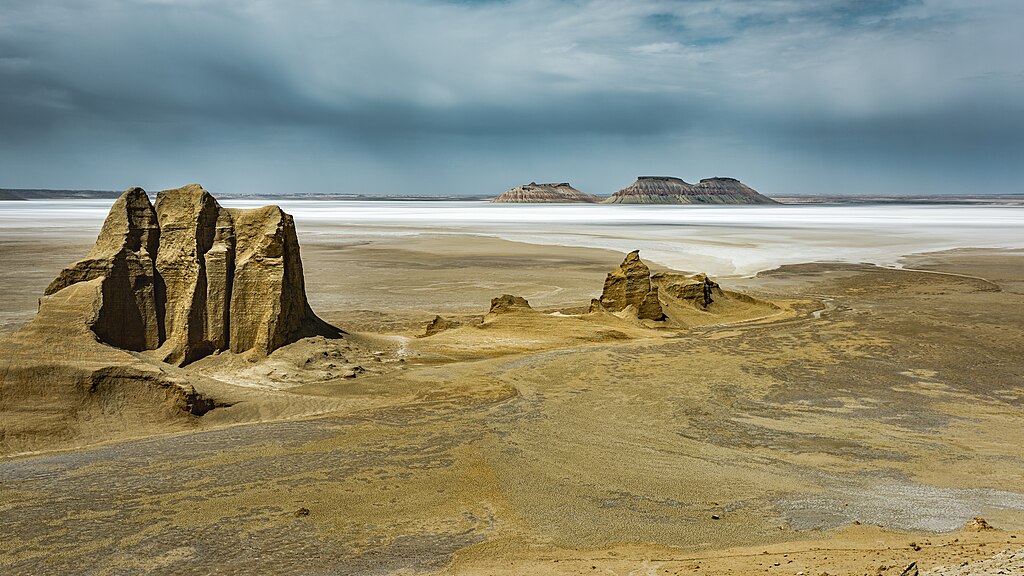
Photo by Maksat Bisengaziyev/Максат79, CC BY-SA 4.0
Second place (landscapes): The Ustyurt Nature Reserve in the far southwestern portion of Kazakhstan supports a wide variety of fauna across its varied landscapes, which range widely in elevation. It’s a bit larger than the country of Mauritius. Photographer Maksat Bisengaziyev framed this view of a few of the reserve’s many rock formations so that there would be a diagonal line running from the bottom left to the top right. One judge noted that this technique “created depth without compromising too much of the objects’ sharpness.”
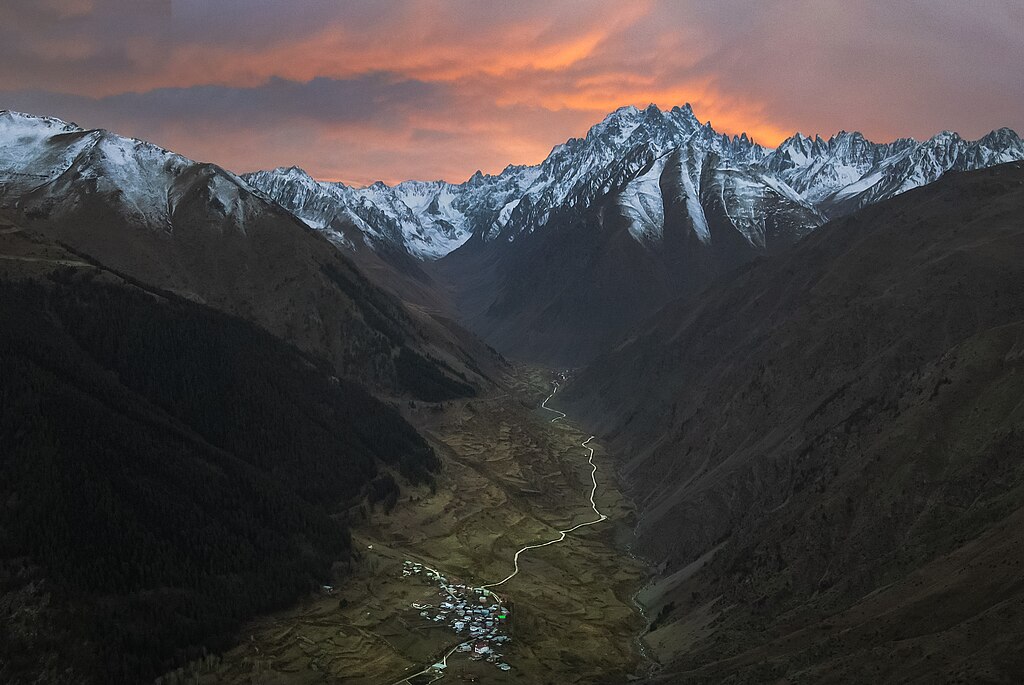
Photo by İsmail Daşgeldi/Ismailtasgeldi, CC BY-SA 4.0
Third place (landscapes): The Wiki Loves Earth judges loved İsmail Daşgeldi’s composition and sense of scale in this photo. A viewer’s eye starts at the top of the enormous and looming mountains. Their true size is slowly revealed as the eye follows the winding road to Yaylalar, a small Turkish village of just 43 people, at the bottom.
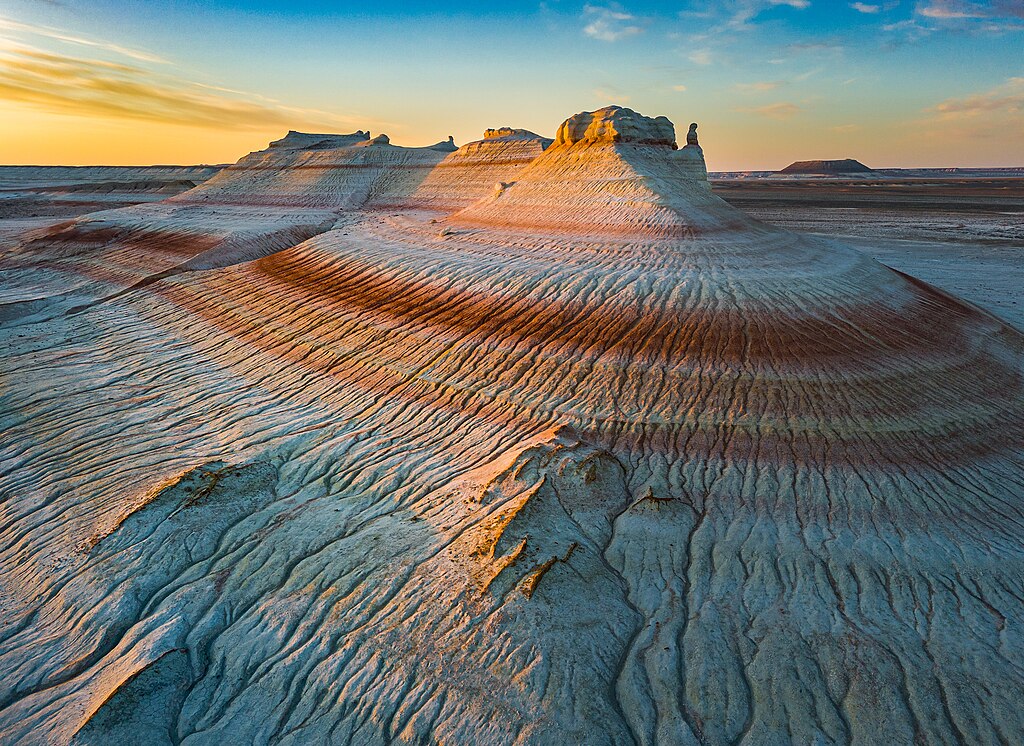
Photo by Maksat Bisengaziyev/Максат79, CC BY-SA 4.0
Fourth place (landscapes): At least one blogger has called this range the ‘tiramisu mountains’, and anyone who has had the Italian dessert would think it’s easy to see why. This is another Maksat Bisengaziyev photo from Kazakhstan, with this one coming from the Kyzylsai Regional Nature Park. “There is something majestic about the composition,” one contest judge saw. “The low light brings out the structure in the surface really well without tinting the color on the stone too much.”
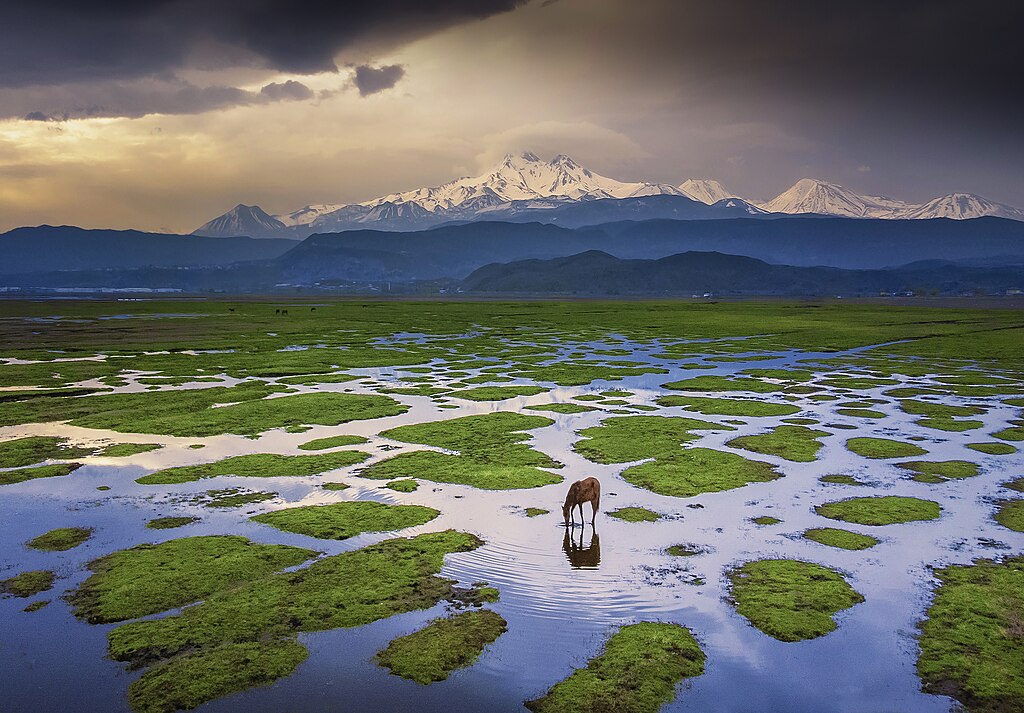
Photo by İsmail Daşgeldi/Ismailtasgeld, CC BY-SA 4.0
Fifth place (landscapes): İsmail Daşgeldi’s sense of scale was on display in this photo, which backdrops the Hürmetçi Marshes with Mount Erciyes on a mid-April morning. But what puts this image over the top is the lonely animal near the center, pausing for a moment to get a drink.
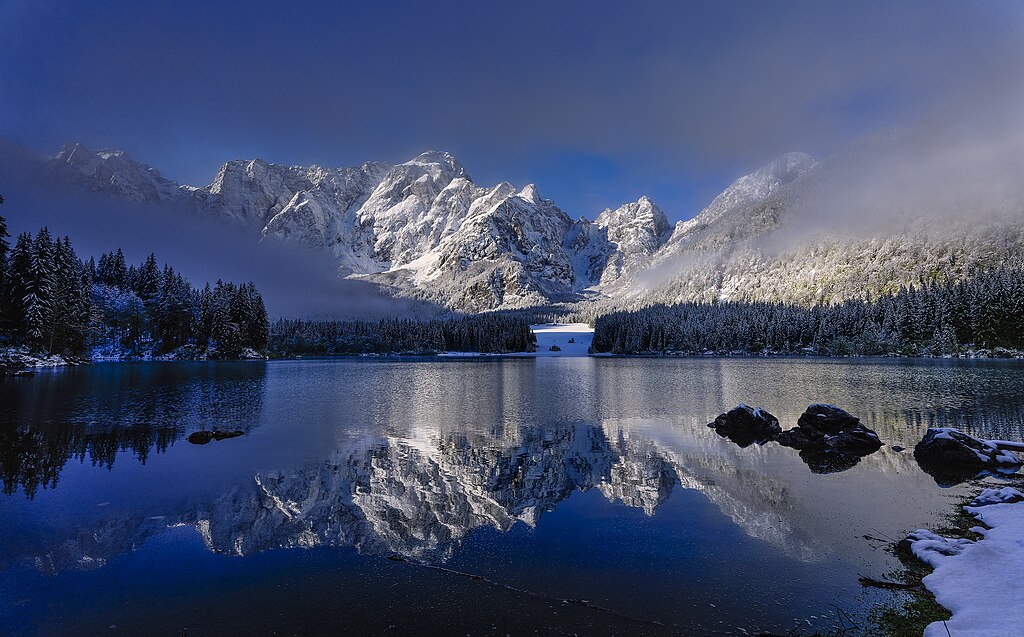
Photo by Missoni Francesco/Scosse, CC BY-SA 4.0
Sixth place (landscapes): Missoni Francesco’s photo of a glacial lake in extreme northeastern Italy brings chills, and not just for the temperature. Wiki Loves Earth’s judges loved the innovative use of the lake’s reflections and the mist swirling around the mountain peaks. “Such deep blues, and in so many shades,” they added.
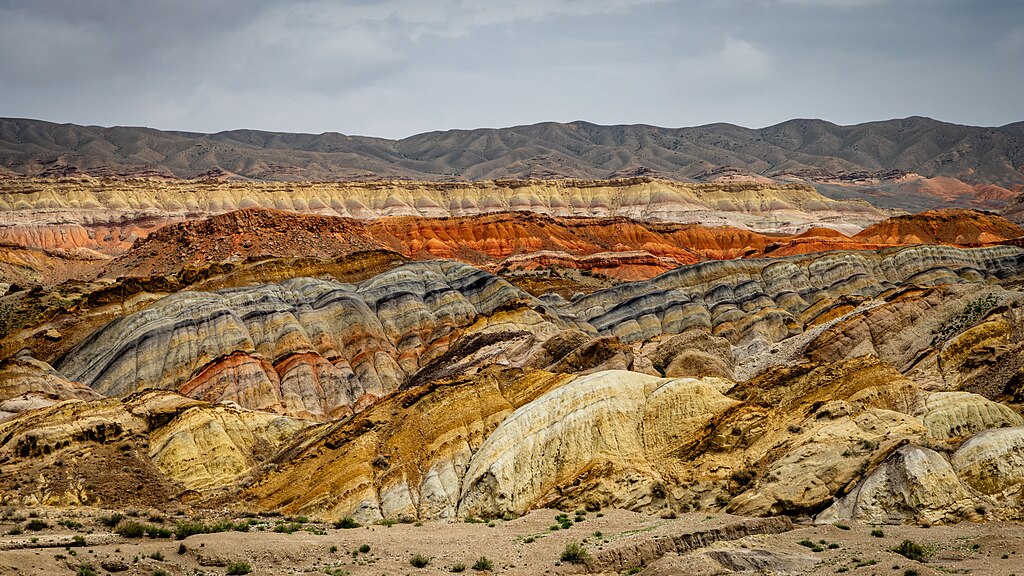
Photo by Marat Nadjibaev, CC BY-SA 4.0
Seventh place (landscapes): The first thing you are likely to notice in this shot of Kyrgyzstan’s Madygen Formation are the colors, resulting from lakes and rivers running their way to a nearby ocean millions of years ago. One contest judge thought that Marat Nadjibaev’s photo “truly makes one appreciate the Earth’s many unseen wonders,” while another opined that the cloudy day helped ensure that a blue sky did not detract from the rock’s colors.
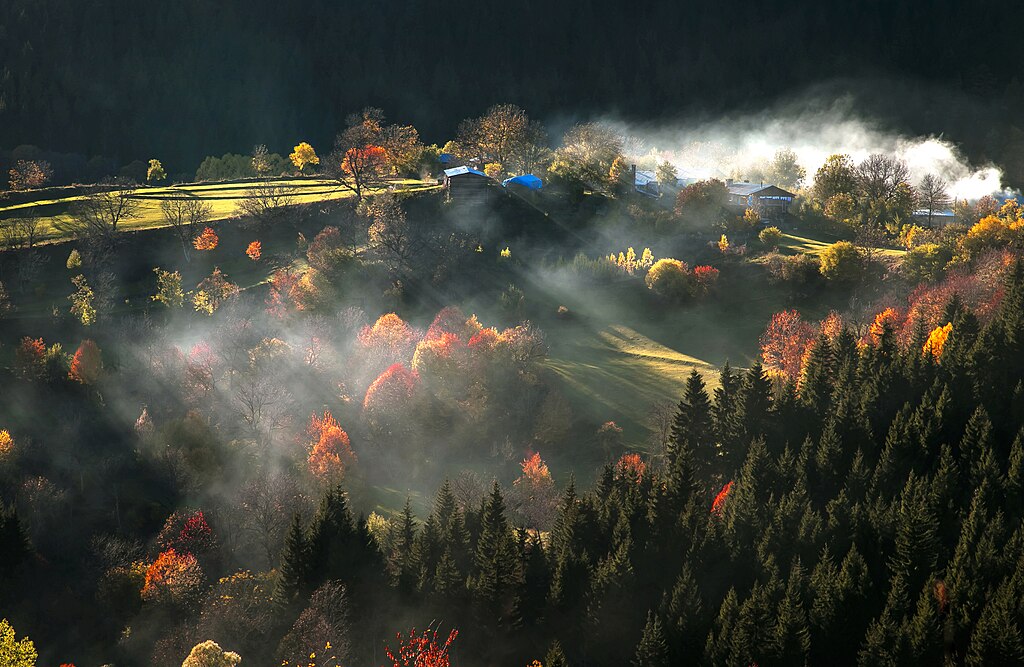
Photo by Turan Reis/Turreis10700, CC BY-SA 4.0
Eighth place (landscapes): On this crisp November morning, Turan Reis got out of bed early to capture a moment in time at Karagöl-Sahara National Park in northeastern Turkey. They discovered morning mist drifting through vibrant autumn trees, with a late-year sun creating lengthy rays of light and deep shadows across a few rolling hills.

Photo by Skander Zarrad, CC BY-SA 4.0
Ninth place (landscapes): Like something out of a Bond film, a fish trap provides the frame for Skander Zarrad’s photo of a fisherman returning at daybreak to sell their catch. This scene was found in Tunisia’s Kerkennah Islands.
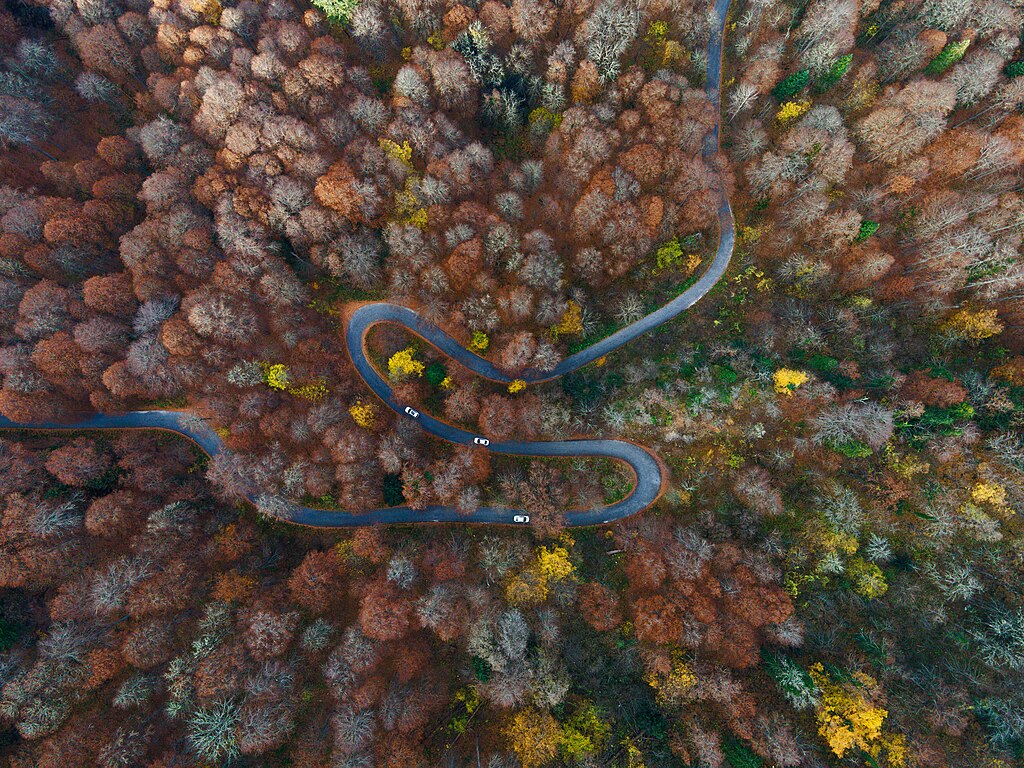
Photo by Ekrem Kalkan/Kecags, CC BY-SA 4.0
Tenth place (landscapes): Wiki Loves Earth’s judges commended the “fantastic perspective” of this top-down shot of Turkey’s Yedigöller National Park, which includes a wide variety of trees in an array of autumnal colors. They also loved how the viewers would be drawn through the photo by the narrow road’s meandering path.
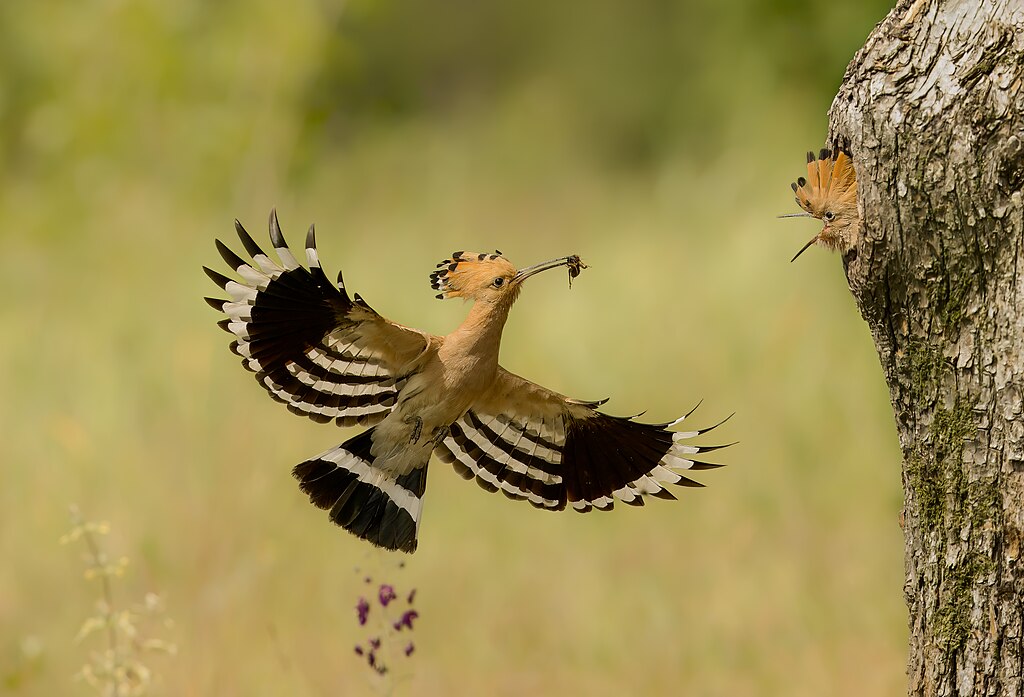
Photo by Lukáš Kött/Luckhy86, CC BY-SA 4.0
Second place (macro): It’s a tender moment between parent and child: this Eurasian hoopoe prepares to feed its hungry offspring with a recently captured bug. Lukáš Kött took this visual poetry in South Moravia, located in the southern Czech Republic near its border with Austria. “Not only full of action, but educational too,” said one Wiki Loves Earth judge. Another photo from Lukáš Kött took tenth place in the macro category.
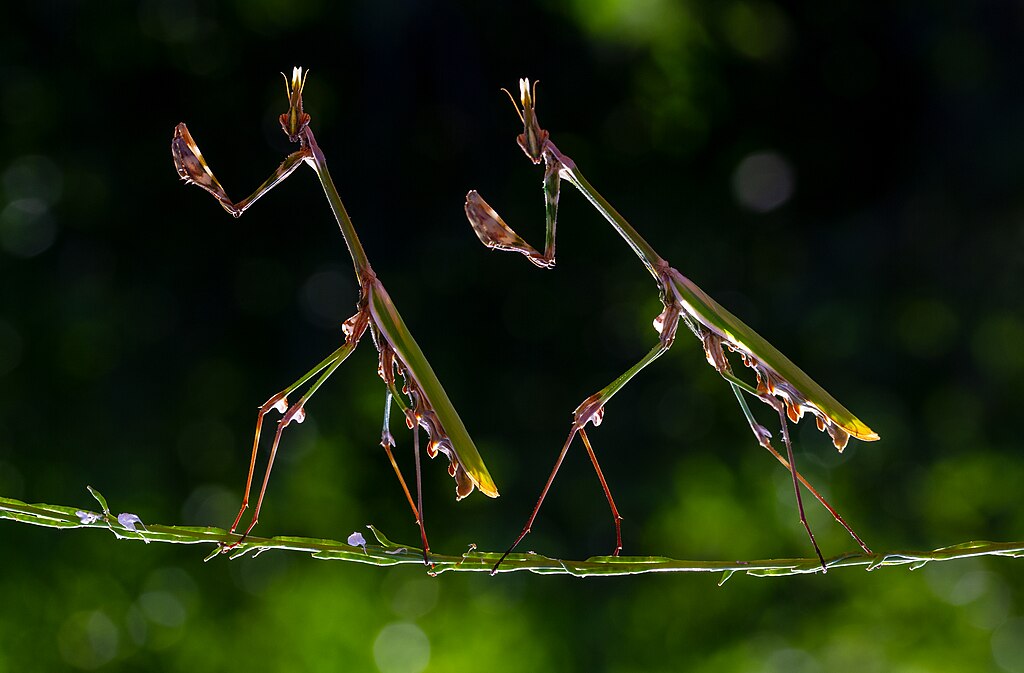
Photo by Mehmet Karaca/Mkrc85, CC BY-SA 4.0
Third place (macro): Mehmet Karaca’s fascinating image of two conehead mantises in Turkey’s Kapıçam Nature Park lends itself to all manner of personification. One judge who reviewed the photo found themselves humming the theme from the classic American comedy The Pink Panther. What do you see?
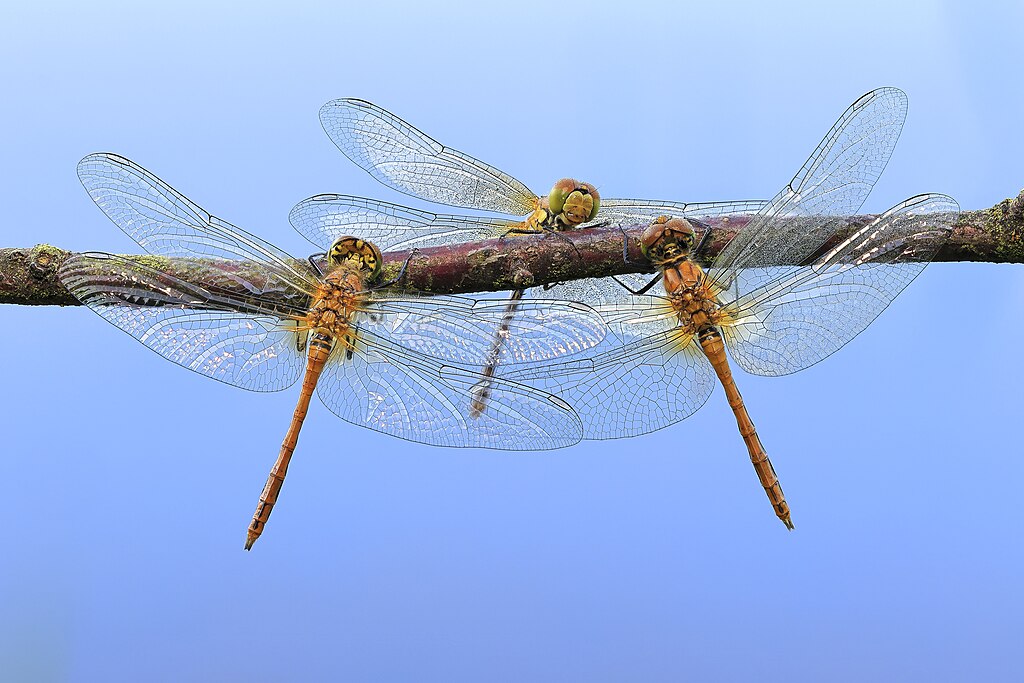
Photo by Lubomír Dajč, CC BY-SA 4.0
Fourth place (macro): It may look like these yellow-winged darters are taking a break from work, but they’re not old enough to fly yet. These newly hatched animals are drying out on a twig in the Czech Republic’s Žďárské vrchy protected natural area. One judge called out Lubomír Dajč’s photo for its “wonderfully crisp contours” and added that it was “oozing complementary colors”.
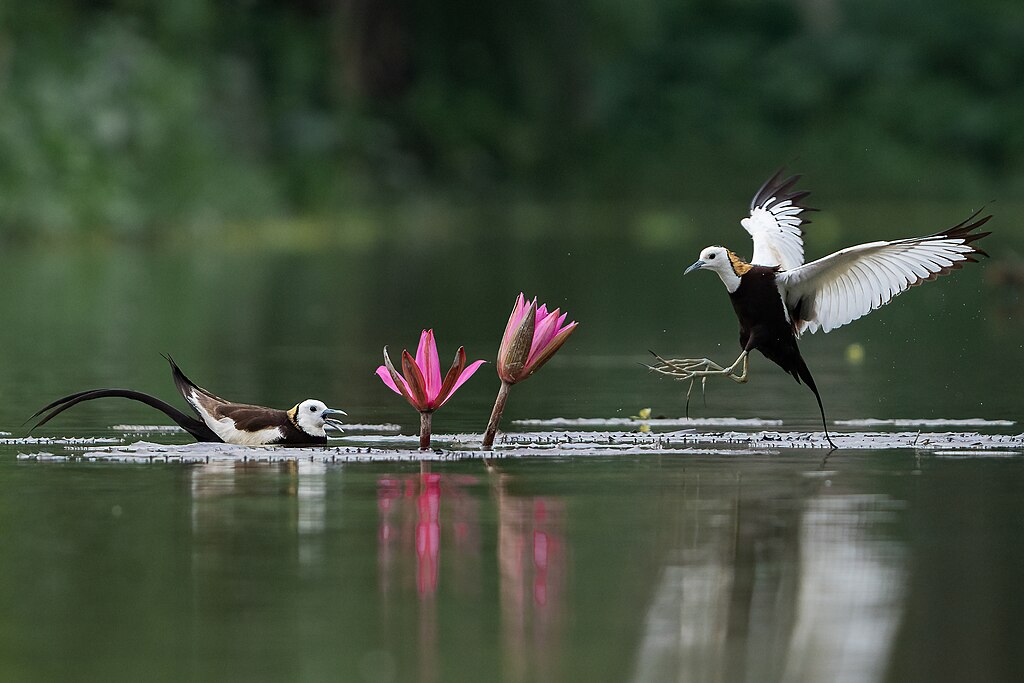
Photo by Anissheikh2647, CC BY-SA 4.0
Fifth place (macro): User:Anissheikh2647 helped this bonded couple of pheasant-tailed jacanas while the birds went through the difficult process of raising a chick. ” I love many aspects of this shot,” one judge said. “The color palette reinforces the composition, the sharpness of the details is just right and complements the bokeh effect, and the contrasting motion between the two birds is beautifully captured, adding levels to the image”.
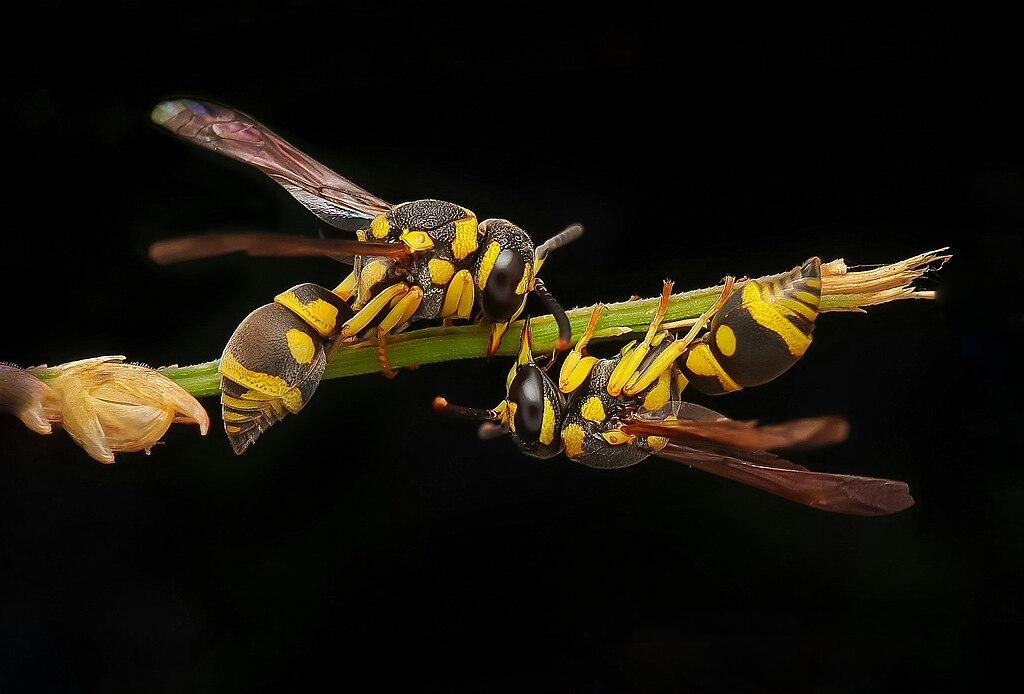
Photo by Mark Kineth Casindac/Kramthenik27, CC BY-SA 4.0
Co-sixth place (macro): The first of two consecutive photos from Philippine photographer Mark Kineth Casindac, also known as User:Kramthenik27, sees these two Apodynerus flavospinosus or potter wasps hanging onto some sort of stalk in Northern Negros Natural Park. The Wiki Loves Earth judges loved the colors on display in this shot, as well as the sharpness Mark Kineth Casindac was able to obtain on the small creatures.
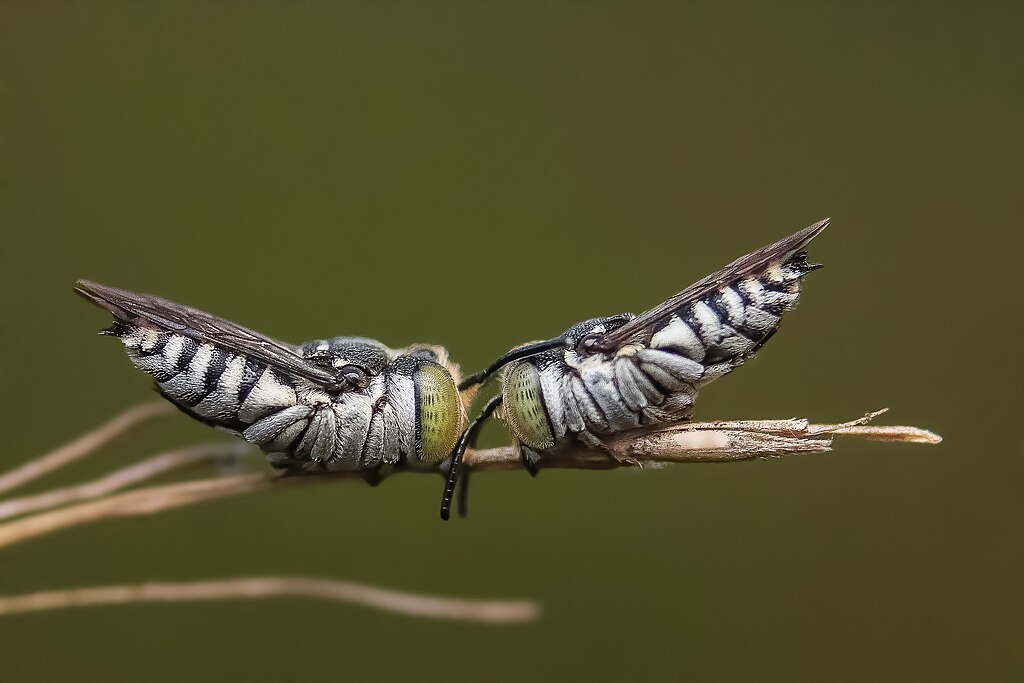
Photo by Mark Kineth Casindac/Kramthenik27, CC BY-SA 4.0
Co-sixth place (macro): Mark Kineth Casindac’s second shot found two leaf-cutting cuckoo bees sitting face to face in the same park. The photographer noted that these bees are endemic to the Philippines, and they can be commonly found in grassy areas. “The composition is simple and clean, but well-structured,” one contest judge noted.

Photo by Mehmet Karaca/Mkrc85, CC BY-SA 4.0
Seventh place (macro): Another photo from Mehmet Karaca, the third-place macro winner, shows that enjoying the morning sun is absolutely not limited to the human race. This baby chameleon, which is evidently no bigger than a flower, is getting a few rays in Turkey’s Kapıçam Nature Park.
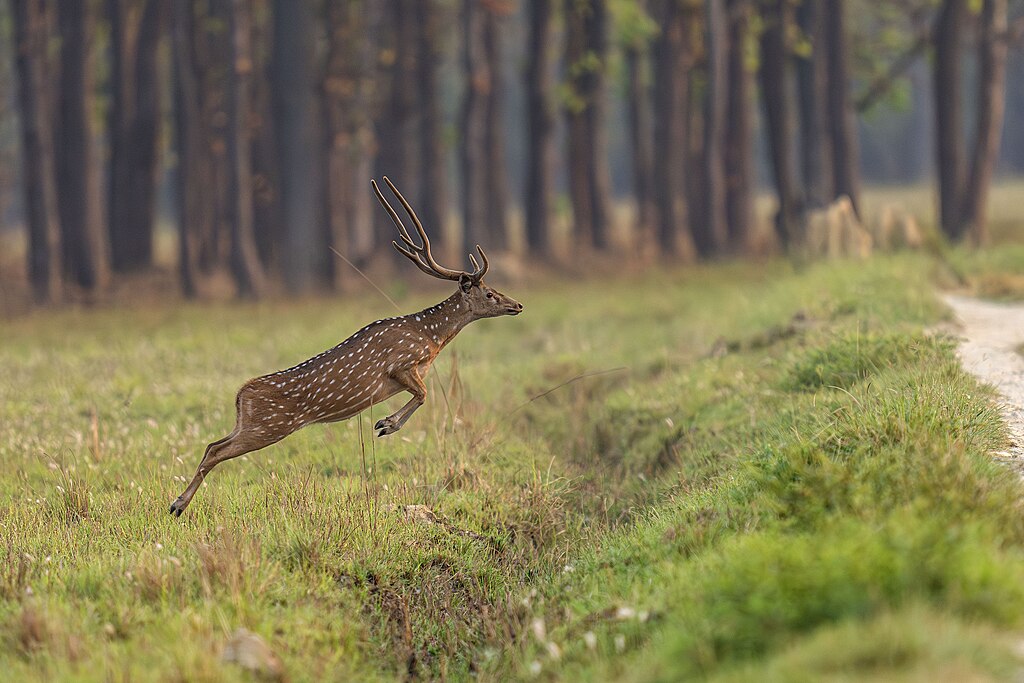
Photo by Dasrath Shrestha Beejukchhen, CC BY-SA 4.0
Eighth place (macro): We do not know why this Nepalese spotted deer is in full sprint. But no matter why it got moving, photographer Dasrath Shrestha Beejukchhen ultimately benefited from the deer’s leap to get onto the path running along the right side. One judge noticed that the dots on the side of the deer were stretched—an indicator of the speed at which it was moving.
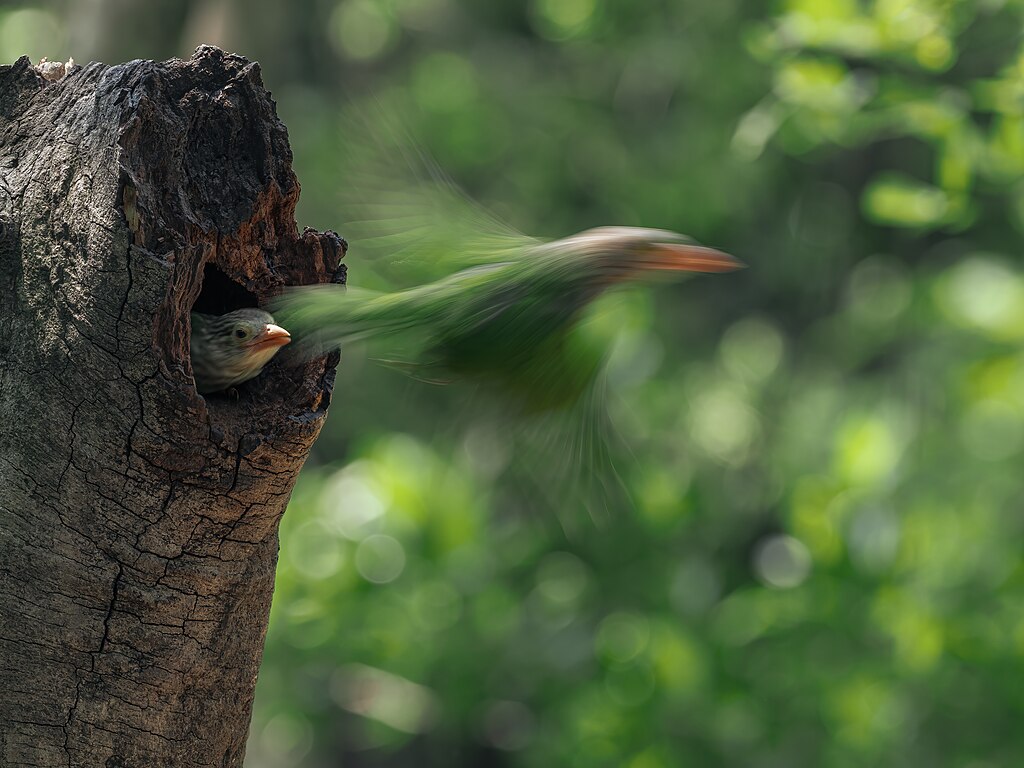
Photo by Asker Ibne Firoz, CC BY-SA 4.0
Ninth place (macro): This is not your standard nature photo. In this shot, Asker Ibne Firoz sharply captures a stationary lineated barbet chick in its nest right alongside its fast-moving mother. Wiki Loves Earth’s judges applauded the technical skill on display in this photo, with one adding that Firoz managed to take “an artistic approach” that nevertheless “retained its educational potential.” Firoz found this scene at the National Botanical Garden in Dhaka, Bangladesh.
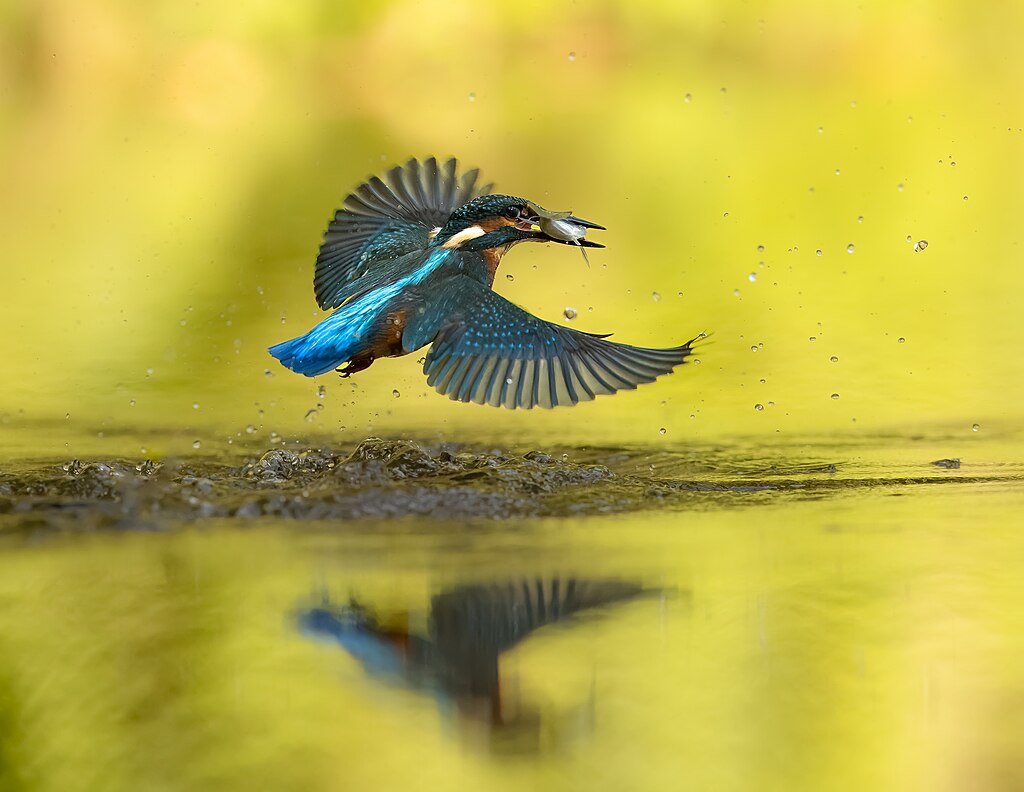
Photo by Lukáš Kött/Luckhy86, CC BY-SA 4.0
Tenth place (macro): This river kingfisher has gotten lucky today: it just caught its next meal in the Poodří Protected Landscape Area of the Czech Republic. This is Lukáš Kött’s second photo to place in Wiki Loves Earth 2024’s winners; the judges were a fan of the varied colors, including the contrasting background, and the action implied in the shot.
Volunteer-led and organized, Wiki Loves Earth asks people to venture out into nearby natural areas. The contest’s definition of a natural area is intentionally broad, which helps ensure that anyone, anywhere, is able to participate. The photographers’ submitted work is uploaded to Wikimedia Commons, a media library that holds many of the photos used on Wikipedia. All of the content within that library is freely licensed; it can be used by anyone, for any purpose, with only a few restrictions.*
If you would like to submit your own photos for Wiki Loves Earth 2025 next year, keep an eye on wikilovesearth.org for organizing information and dates. You can also see the winning images from Wiki Loves Earth’s special nominations category of human rights and environment.
———
Post by Ed Erhart, Communications Specialist, Wikimedia Foundation.
*Please be sure to follow each image’s copyright tag. All of the images above, for instance, are available under a Creative Commons CC BY-SA license—you are free to share them for any reason so long as you give credit to the photographer and release any derivative images under the same copyright license.
The post “Straight out of a mystery”: The winners of Wiki Loves Earth 2024 appeared first on Wikimedia Foundation.
In mid-December 2024, a significant milestone was achieved on the
English Wikipedia: women's biographies now account for 20% of all
biographies. This landmark moment was officially recorded on
December 19, 2024, when the Women in Red WikiProject updated its statistics,
revealing that out of 2,040,570 total biographies on Wikipedia,
408,183 are dedicated to women, marking a ratio of 20.003%.
The journey to this milestone began nearly ten years ago with the establishment of the Women in Red Wiki Project when, initially, only 15.5% of biographies on the English Wikipedia were about women. Since then, a global effort has been underway to raise the bar and write biographies of women in every country, time period, and occupation.
In 2024, Wikimedia Australia hosted numerous editathons to increase the representation of women on Wikipedia. Thank you to our partners and tireless volunteers for helping us deliver such successful events, including the Countess.Report and Artbank Wikipedia Edit-a-thon, Franklin Women, Know My Name, Art + Feminism, The Lost Women of Cybernetics and Women in Biomechanics - Your dedication is a testament to the power of collaboration and the importance of inclusive representation.
Read more about how we got to 20% on the Women in Red Project page on Wikipedia.
| previous | 2024, week 52 (Monday 23 December 2024) | next |
There is no technical newsletter this week.
December 2024 brought an essential milestone for wiki platforms with MediaWiki's 1.43 LTS release. While version numbers often come and go, this update stands out by offering extended support through December 2027 as a Long-Term Support release – crucial for organizations building their knowledge bases for the long haul.
From enhanced security features and more competent template handling to improved multilingual support and accessibility updates, version 1.43 brings practical changes that matter in day-to-day wiki operations. Whether managing documentation for a small team or running a knowledge base for a company or wiki community, these improvements make wiki management more efficient.
Ready to explore what's new? Jump to any section in the table of contents below to learn more about the features that interest you most!
Summary:
MediaWiki 1.43 introduces powerful tools like enhanced password
reset security, smarter template cleanup, and better namespace
management with “Special:NamespaceInfo”. These updates streamline
workflows, improve security, and enhance user experience.
Why this matters:
These tools make it easier for wiki users and admins to manage
content effectively, saving time and reducing the risk of errors,
especially for large or complex wikis.
MediaWiki now offers an extra layer of protection for password resets. Users can require a username and email address to trigger password reset emails in their preferences. This dual-verification approach reduces the risk of spam, username enumeration attacks, and unwanted resets. It’s a simple yet effective way to enhance security, particularly for wikis concerned with privacy or targeted attacks.
Linking to discussion pages became a whole lot easier. MediaWiki’s new “Special:TalkPage” utility makes namespace navigation effortless for everyone. This intelligent redirector seamlessly routes users to the correct discussion page, no matter the originating namespace.
For example, visiting “Special:TalkPage/PageName” redirects you to “Talk:PageName”, while “Special:TalkPage/Project:PageName” takes you to “Project_talk:PageName”. This simple feature solves a surprisingly tricky problem behind the scenes.
The real magic of “Special:TalkPage” lies in its benefits for template creators and tool developers. Previously, implementing logic to determine if a namespace had an associated talk page, and what its name would be, required considerable effort. Now, just point to “Special:TalkPage” with the target title, and MediaWiki does the heavy lifting.
MediaWiki has made template maintenance easier and more
efficient with the new __EXPECTUNUSEDTEMPLATE__ magic
word, implemented as a behavior switch. This magic word allows
editors to exclude specific templates from the list of unused
templates on “Special:UnusedTemplates”, cutting down on noise and
spotlighting genuinely abandoned templates.
This feature is ideal for template sandboxes, test cases in documentation, and substitution-only templates that aren’t directly used.
By adding __EXPECTUNUSEDTEMPLATE__ to a template,
wiki gardeners can keep the list clean, making it easier to
identify and manage unused templates. This enhancement streamlines
workflows and improves tools for content curation while honoring
valid use cases for templates.
MediaWiki has rolled out “Special:NamespaceInfo”, a new special page designed to simplify namespace management. This page provides an organized table displaying essential details, including:
This new special page is a handy reference for administrators and users. It centralizes information that you previously could only find by sifting through documentation or special pages.
“Special:NamespaceInfo” enhances site management tools, making technical details more accessible and manageable for everyone.
When the creation of temporary accounts on page save is turned
on with configuration parameter $wgAutoCreateTempUser (disabled by
default since it is still considered a beta feature), MediaWiki now
creates temporary accounts for all edit attempts, including
unsuccessful and null edits rather than just for successful
edits.
For administrators, this means more complete logs and deeper insights into the edit patterns, even when no content changes occur. This change will significantly boost MediaWiki’s moderation capabilities and the understanding of its contributors. For more insights, have a look at the temporary accounts project page.
MediaWiki has introduced a new feature designed to give wiki communities more control over category sorting and better accommodate their diverse organizational needs. Wikis organize and display categories on pages in different ways, some treat categories as unordered sets, while others require a specific order. Until now, there hasn’t been a built-in solution to support both approaches.
This new feature allows wikis to customize how categories are
sorted on pages, making it easier to adapt category organization to
their preferences. Controlled by the $wgSortedCategories configuration
parameter (defaulting to false and currently considered
experimental), the feature enables the option to enforce
alphabetical sorting of categories.
Summary:
With features like the {{USERLANGUAGE}} magic word and
smarter text direction handling, MediaWiki 1.43 simplifies
multilingual content delivery, offering greater personalization and
performance for diverse wiki communities.
Why this matters:
For wikis serving multilingual audiences, these updates improve the
user experience by tailoring content to individual language
preferences and ensuring smooth, accessible navigation across
languages.
For multilingual wikis, delivering content tailored to each
user’s language preference can significantly enhance the user
experience. MediaWiki’s new configuration option, $wgParserEnableUserLanguage (turned
off by default), empowers wikis by allowing the
{{USERLANGUAGE}} magic word, implemented as a
variable, to adapt dynamically based on the user’s preferred
language.
This flexibility is a game-changer for wikis serving various language wiki communities, making it easier to provide personalized, accessible content. By default, the magic word reflects the page’s language, but enabling the new setting ensures that content aligns with individual user preferences.
However, this personalization comes with a trade-off: enabling the feature increases the burden on performance. Wikis focused on performance, likely large with a lot of traffic, may stick to the default setting, while those prioritizing a customized experience can adopt the feature with care.
MediaWiki continues to improve in multilingual support, and the
introduction of two new parser functions, {{#dir}} and
{{#bcp47}}, takes this even further by simplifying
language direction and code management while improving
performance.
{{#dir}} parser
function: It intuitively detects text direction based on
language or script codes. For example:
{{#dir:en}} outputs "ltr," while
{{#dir:ar}} outputs "rtl".{{#dir:Arab}}
and complex cases like {{#dir:und-arab}} seamlessly,
outputting "rtl" when appropriate.{{#bcp47}} parser
function: IT standardizes language code handling with full
compliance to the so-called BCP47 standard, essential for multilingual wikis.
For instance:
{{#bcp47:sr-ec}} transforms the input to
"sr-Cyrl," indicating Serbian in Cyrillic script.{{#bcp47:zh-yue}} simplifies the input to "yue",
identifying Cantonese specifically.These parser functions replace template-based solutions, significantly reducing server load, streamlining maintenance, and boosting overall performance.
By automating these processes, MediaWiki empowers editors to focus on creating content rather than managing technical complexities. Now, you can migrate or replace your templates using this new feature.
Summary:
Accessibility improvements in MediaWiki 1.43 include refined color
schemes, better image handling, and an updated search page for
modern browsing. Usability enhancements, such as more apparent page
protection indicators, further enhance user experience.
Why this matters:
These enhancements make wikis easier to use for everyone, including
those with visual impairments or other accessibility needs,
ensuring a more inclusive and enjoyable browsing experience.
MediaWiki has introduced thoughtful updates to enhance accessibility and text readability, creating a more consistent and intuitive user experience. These updates introduce a range of improvements to improve functionality and aesthetics, ensuring better usability across all viewing modes and skins, including those without dark mode support. The key highlights include:
These updates enhance the user experience by improving readability and accessibility and creating consistency across MediaWiki.
MediaWiki fully supports WebP image metadata, extracting XMP and EXIF data alongside traditional formats. Wikis using the external images feature get support for modern formats like AVIF, SVG, and WebP, enhancing compatibility with web-optimized visuals. Additionally, captions retain intentional spacing, offering editors greater precision and control over their presentation.
MediaWiki’s search page got an upgrade. Further improvements may follow, switching from a table layout to a sleek CSS flexbox design. This isn’t just about aesthetics, it’s a big win for accessibility and usability. Screen readers now navigate search results more naturally, keyboard navigation feels smoother, and the page is far more responsive on mobile devices.
The page protection status will be easier to identify in
MediaWiki, thanks to a new feature controlled by the $wgEnableProtectionIndicators
configuration parameter (disabled by default). This enhancement
introduces visual protection indicators, such as lock icons at the
top of protected pages, giving users a quick and intuitive clue
about a page's protection.
MediaWiki has updated its HTML for wikitext headings, improving
navigation for screen reader users and aligning with modern web
standards. A new configuration parameter, $wgParserEnableLegacyHeadingDOM,
lets administrators enable the updated markup. Legacy behavior
remains the default, but this will be changed in future releases.
Skins must explicitly support the new structure to ensure
compatibility.
Previously, screen readers read out interface elements like edit links as part of headings, creating cluttered navigation. The new markup eliminates these issues, offering cleaner, more accessible browsing.
MediaWiki 1.43 introduces only a few operational adjustments for those managing MediaWiki systems. System administrators should review the configuration updates outlined in the RELEASE NOTES to ensure their installations run smoothly.
This release also brings notable improvements for the development community. Software engineers and extension developers will benefit from the improved API and expanded evelopment tools that enhance their ability to create custom solutions. These updates support the development of more efficient and adaptable extensions, resulting in better-performing MediaWiki sites. For a detailed breakdown of all technical modifications, developers should reference the sections on new developer features, breaking changes, and deprecations within the RELEASE NOTES.
Before upgrading to MediaWiki 1.43, check your upgrade path, system requirements, and compatibility:
If you’re using MediaWiki 1.39, it’s time to start thinking about your next move. Sure, support for 1.39 doesn’t end until December 2025, but that doesn’t mean you should put off your upgrade until the last minute. Moving to MediaWiki 1.43 now is the smart choice—and here’s why.
Beyond the latest security, performance and stability improvements, upgrading now means you'll also get all the features added in versions 1.40 through 1.42. Curious about what's in each version? We've covered all the highlights in our previous blog posts about MediaWiki 1.40, MediaWiki 1.41, and MediaWiki 1.42. Plus, you won't have to rush when support ends in December 2025. It's better to handle any hiccups now rather than under pressure later.
Before you upgrade, examine the extensions and skins you’re using closely. The bundled extensions and skins with MediaWiki will work fine in 1.43, but custom or third-party extensions and skins might not be ready. If you’ve built specific functionality around those, it’s vital to double-check their compatibility before upgrading.
Special Note: If you are using the Linter extension, take extra care when upgrading to 1.43. This release makes major changes to how the Linter extension stores its data in the database, so be sure to review the RELEASE NOTES for details to avoid any surprises during the upgrade.
Don’t wait if you’re on a version older than 1.39. The need to upgrade is even more urgent. Old versions can open your wiki to security vulnerabilities and compatibility problems with newer tools and systems. 1.43 is the way to go if you want a system that’s reliable, secure, and ready for whatever comes next.
As always, we strongly recommend thoroughly testing the upgrade process in a staging environment before deploying it to production to identify and resolve potential issues with the software.
For comprehensive assistance on handling MediaWiki, check out our upgrade guide. It contains detailed instructions for installation and configuration.
Having spent time with MediaWiki 1.43, it's clear this isn't just another version bump. For wiki administrators who've wrestled with multilingual content issues or struggled to make their sites more accessible, this update delivers real solutions. The community's fingerprints are all over these improvements – from the way language direction handling has been simplified to the smart new protection indicators that even new users intuitively understand.
Sure, upgrading requires careful planning – especially if you're running custom extensions or coming from a pre-1.35 version. However, with three years of long-term support and a wealth of new features that address real-world challenges, version 1.43 is an upgrade worth making. Start evaluating your environment today to take advantage of the advancements that can make your platform more efficient, accessible, and secure. Whether you're managing documents for a small team or running a community platform with thousands of users, this release proves that MediaWiki is evolving to serve you.
Create your wiki instantly via ProWiki. Never worry about upgrades again. Get started immediately via the free trial, or contact us to migrate your existing wiki.
12/12/2024-18/12/2024
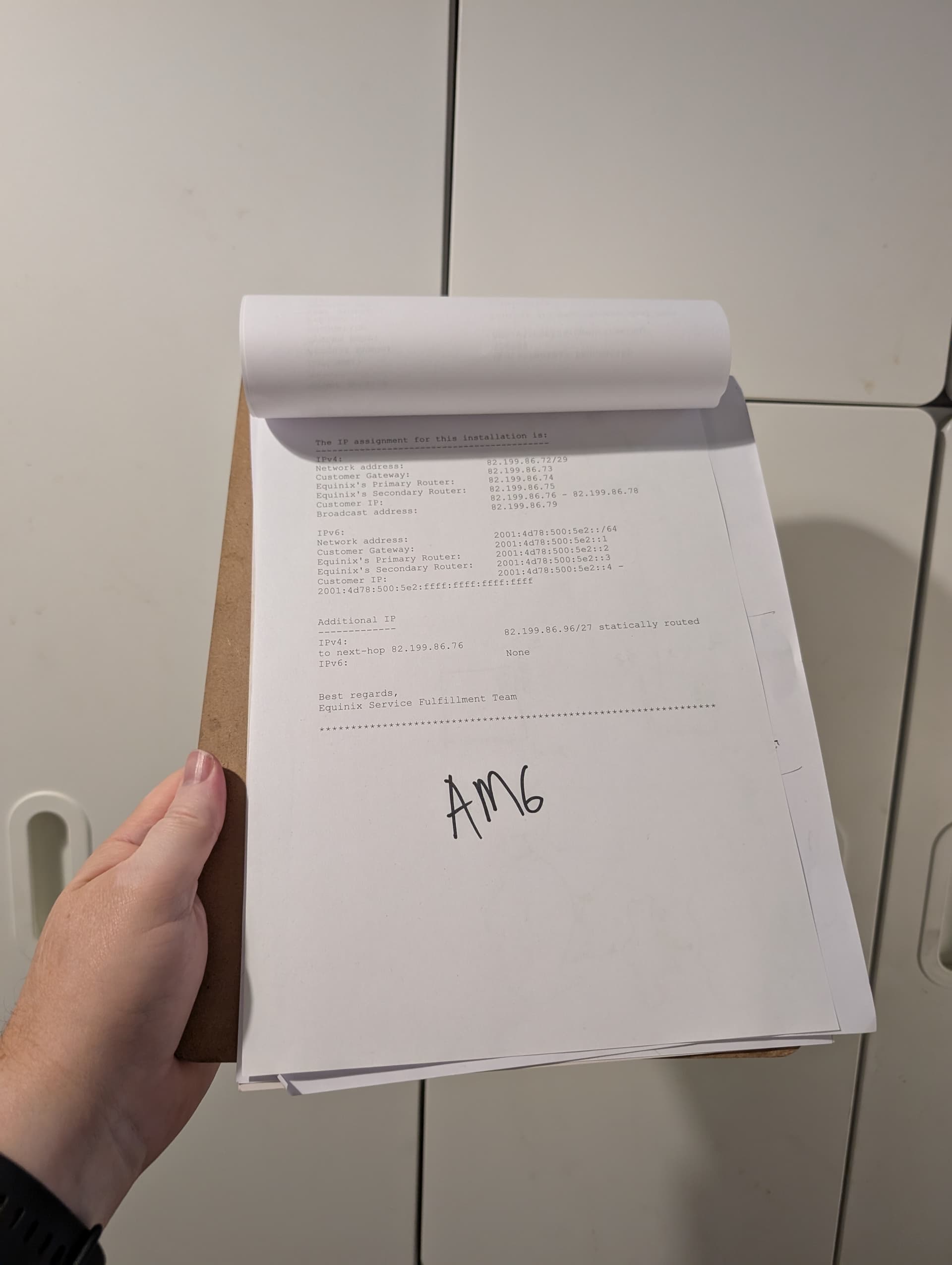
“Notes?!? Firefishy has a CLIPBOARD!” – This historic clipboard details the OSM’s recent ISP migration to Equinix Internet, as an effort to mitigate the 57-hour OSM outage caused by a router failure in Amsterdam (IPv6 was added later in the day). [1] | © Firefishy
oneway:foot=*, for marking one-way
restrictions on pedestrian paths and improving data for routing in
areas with controlled pedestrian movement, is open for voting until
Tuesday 31 December.Note:
If you like to see your event here, please put it into the OSM calendar. Only data which is there,
will appear in weeklyOSM.
This weeklyOSM was
produced by Grass-snake,
MatthiasMatthias,
PierZen,
Raquel Dezidério Souto, Strubbl, TheSwavu,
barefootstache,
derFred,
kabarmaz,
mcliquid.
We welcome link suggestions for the next issue via this
form and look forward to your contributions.

(Screenshot of the landing page https://adicita.gimpscape.or.id/)
From October to November 2024, Creative Commons Indonesia and
Gimpscape ID (Open Source Community), supported by the Komunitas
Guru Belajar Nusantara (KGBN) and SEAMEO SEAMOLEC, organized Kontes
Ilustrasi Bahan Ajar.
The contest aimed to support educators in creating engaging and
accessible digital teaching materials. By producing open-licensed
illustration assets, educators now have more visual options that
can be freely used without worrying about copyright issues.
This contest marked the third competition held by CCID and Gimpscape ID Community, continuing the two previous contests: the Infographic Design Contest in 2022 and the Adaptation Works Contest in 2019. In the previous two contests, participants were required to use open-source software. This year, the main focus shifted to the work format, with participants being asked to produce works in the open SVG format to reach a wider user.
The contest began with an in-depth survey of educators, particularly those teaching kindergarten and elementary school children. The survey aimed to understand the types of illustrations most needed in the teaching and learning process. Based on the survey feedback, participants were guided to create illustrations based on themes that are relevant, educational, and engaging for children.

(Screenshot of the category in Wikimedia Commons)
A total of 16 participants, consisting of talented illustrators, contributed to this contest. Within a limited timeframe, they managed to produce outstanding works. A total of 240 illustrations were uploaded to Wikimedia Commons. All illustrations are licensed under CC BY-SA 4.0, allowing users to use and distribute the illustrations as long as they attribute the original creators. Furthermore, this teaching material illustration work will be recommended for participants of the Open Learning Resources (OER) Online Training to be used in creating digital teaching materials.
The winners were announced on November 10, 2024, coinciding with Indonesia’s Heroes’ Day. This timing was chosen to highlight that the participants are heroes for educators. Sarmina, one of the judges, noted that these illustrations are highly beneficial for teachers, especially in online classes, as they support the delivery of meaningful material. She also emphasized the SVG format’s ease of adaptation and safety for use, being free and open, making the contest’s outputs invaluable in the digital era.
Here are some responses from participants involved in the Kontes Ilustrasi Bahan Ajar:
The success of this contest opens up opportunities for similar activities in the future. With more collaboration between educators, illustrators, and digital platforms like Wikimedia Commons, the potential to enrich open learning resources will grow even further.
For those interested in viewing the participants’ works, all illustrations can be accessed on Wikimedia Commons under the category Category:Ilustrasi Bahan Ajar. If you have illustrations that you would like to add to support educators in creating teaching materials, your works can also be uploaded to the same category.
Let’s support inclusive education through creative works and sharing!
In late 2023, an article claimed that Wikipedia is one of the fastest websites in the USA. Flattering, right? I've been measuring web performance for over a decade, I couldn't help but wonder: How did they measure that? How do you know that Wikipedia is one of the fastest websites? The article does not say anything on how they did measure it.
I went to the Web Performance Slack channel (yes, there's a dedicated place where web performance geeks hang out). I asked the question:
“Has anyone seen the data or the actual “study” done by DigitalSilk about the fastest loading US websites? https://www.technewsworld.com/story/craigslist-wikipedia-zillow-top-list-of-fastest-us-websites-178713.html - I can only find references to it and a screenshot, nothing else?”
Not providing references? That's not Wikipedia! We're all about citations and verifiable sources. No one on the Slack channel knew anything about how the test was run. But then, one of the channel members took action: Stoyan Stefanov emailed the journalist and actually got an answer!
Methodology
The most visited websites based on web traffic were ran through Google's PageSpeed Insights tool, to find out how long it takes for each site to load in full on average“
So, while it's flattering to see Wikipedia crowned as one of the fastest websites based on Google's PageSpeed Insights tool, I couldn't help but feel a tricked. They seemed to rely on the onload metric. That's a metric that, in the web performance world was regarded as old and not correlating to user experience since 2013.
Understanding the limitations using the onload metric, let’s shift our focus to modern metrics that better reflect real-world user experiences: Google Web Vitals
Google Web Vitals is Google's initiative to focus on the metrics that matter to users and also affects Googles core ranking system. Unlike the old-school onload time, Google Web Vitals better measure aspects of real world user experience.
The core metrics at the moment are three metrics:
Google also have two other web vitals, two metrics that are important for the user experience but not listed as core:
Google pay special attention to the 75th percentile of those metrics. It was chosen because "First, the percentile should ensure that a majority of visits to a page or site experienced the target level of performance. Second, the value at the chosen percentile shouldn't be overly impacted by outliers.". But what does the 75 percentile mean for us at Wikipedia?
Now let’s put the 75th percentile into perspective by applying it to Wikipedia’s vast global audience.
Imagine that there were 100 people visiting Wikipedia. Each person got a different user experience because of their device, the internet connection and how we build Wikipedia. For some users the experience will be really fast, for some it will be slower.
The 75th percentile focus on the worst experience of the best 75%. If you take all 100 users and then sort the experience from fastest to slowest, the 75th experience is where you draw the line. This means that 75% of the users had a better or equal experience and 25% had a worse one. So, how many users are in that 25% for us? We measure unique devices and not users so lets use that.
Well, for Wikipedia, those 100 users are actually 1,5 billion unique devices per month and 24 billion page views.
That means if we look at the 75 percentile and we see that a metric move we know that at least 6 billion page views per month ( 24 billion × 0.25) is affected. And 375 million unique devices (1.5 billion × 0.25).
That is many devices. Suppose we have a regression of just 100 milliseconds in the 75th percentile. That is at least 375 million devices are experiencing this delay. Collectively, those users are waiting an extra 434 days. Yes, over a year of extra wait time for the users with the worst experience because of a (tiny) 100 ms change.
With the metrics Google collects from different web sites, you can compare different sites with each other! The metrics are available per domain (not user country), so we can not compare if the English Wikipedia is one of the fastest web sites in the USA, but we can compare the English Wikipedia against other web entities with users all around the world.
However before we do that, I want to point out that "Is the English Wikipedia fastest website in USA according to Google Web Vitals?" is a very exclusionary question to ask since:
Looking just at "Are we fast in the USA" we leave out a big part of the world. So today we gonna look at the English Wikipedia compared to other web sites and then also look at Wikipedias all around the world to see what kind of user experience all users have.
But first let's talk about how Google also categorises these experiences as good, needs improvement, or poor by setting specific limits for each metric. With Googles definitions we can see how many of our users have different kinds of experiences. In the data I will show, green means good, needs improvement yellow and red means bad/poor experience.
We collect all data that is available through the Chrome User Experience API and you can see that in our Chrome User Experience dashboard. There's a lot of metrics, so I will focus on just the Largest Contentful Paint today.
First let's look at the actual 75 percentile Largest Contentful Paint. We compare against a couple of other web sites. Lower numbers are better. Green is good. We will start to look at the numbers for mobile.
This graph highlights that Wikipedia's mobile LCP performance is nearly as fast as Google's, which is quite remarkable!
We can also look at how many of our users have a slow/bad experience.
Wow we can see that we have less users in percentage with a bad experience than the rest of the sites. However the graph shows a small percentage of mobile users experiencing suboptimal LCP. For a website of Wikipedia's scale, this small percentage translates into millions of users, we need to be even better!
I wonder if it's the same for desktop users? Lets look at the 75 percentile again.
Again we can see that Wikipedia is almost the fastest, outperforming many major websites! We seem to be fast on both mobile and desktop.
Yes we are really fast! Can we open the champagne and celebrate?
Well I would take it a little easy here before we start to brag. Do you remember how we calculated how many users are left out when we use the 75 percentile? I would be careful with a web site with so many users. I would say that: "The English Wikipedia is really fast compared to other web pages looking at the Largest Contentful Paint at the 75% percentile for Chrome users that Google collects metrics from".
Another way of looking at the data we get from Google is to see how many users have a bad experience using Wikipedia. By taking the ones that need improvement and poor experience, we can see how many users in percentage we need to move to having a good experience.
First let's look at Largest Contentful Paint again for desktop users. This time we look at the number of users in percentage that have a non good experience per wiki.
And then we look at the same for mobile.
We can see that on desktop and mobile we have Wikipedias where we as developers have work to do to give more users a good experience.
As a last example I want to share the interaction to next paint data for mobile. This is interesting because here JavaScript comes into play and there are many things we can do on our side to give the user a better experience.
We see that for almost every Wikipedia, 5% of the users have a not so good user experience.
Wikipedia's performance story is one of scale and precision. By focusing on Google Web Vitals, we've seen how milliseconds of delay can impact millions of users. Metrics like Largest Contentful Paint (LCP) and Interaction to Next Paint (INP) can provide valuable insights into real-world user experiences, guiding us to optimize for both mobile and desktop users.
With billions of page views monthly, even the smallest regressions in performance ripple across the globe. Yet, Wikipedia stands as a benchmark of speed in the US, rivaling even the likes of Google. This achievement underscores the importance of continuous monitoring, fine-tuning, and maintaining a user-first perspective in web development.
As we celebrate, we also need to acknowledge the challenges. Moving the needle for those users with "non-good" experiences remains our mission. By using data and ongoing analysis, we can ensure that Wikipedia stays fast, accessible, and enjoyable for everyone, everywhere.
An increasing number of volunteers became the target of SLAPPs, particularly due to the widespread reach of Wikipedia. In the last ten years, more than a half of the reported SLAPP cases involving Wikipedians have taken place in Europe.
SLAPPs is an acronym, which stands for Strategic Lawsuits Against Public Participation, used to refer to lawsuits that are not initiated to genuinely assert a right, but to intimidate and silence critics. In such cases, plaintiffs are often powerful natural or legal persons who abuse their position and power, and ultimately also the legal system, to restrict the exercise of freedom of expression of journalists, activists, whistleblowers, artists, trade unions and so on. The negative consequences on the public debate and the right of the public to receive information, opinions and ideas in order to meaningfully participate in the democratic life are blatant. In other words, SLAPPs are a serious threat to fundamental rights and democracy. Unfortunately, this phenomenon has increasingly affected Wikipedians: one could think of the recent lawsuits started in Germany, Portugal or Estonia. Wikimedia Europe has since 2023 joined CASE, i.e. the Coalition Against SLAPPs in Europe, which has been actively advocating for the adoption of the anti-SLAPP Directive and yearly publishes a report identifying SLAPP cases and relevant trends.
From the recently released CASE 2024 SLAPPs Report analysing the situation in Europe between 2010 and 2023, it clearly emerges a growing trend of this vexatious form of lawsuits: in 2023 there have been 166 new cases and a total number of 1049 lawsuits has been reported in the period of reference (2010-2013).
Such numbers are a clear indication of how this worrisome phenomenon is far from being resolved in Europe: freedom of expression and the fundamental value of democracy cannot be taken for granted and need to be daily nurtured and protected.
The final episode of 2024, and 41st broadcast of WikiAfrica Hour, is a special edition! We are showcasing some of the African communities and individuals whose achievements over the past year have contributed to raising our voices as African Wikimedians. As a space where Africa’s Wikimedians can share their work and knowledge, and digest those learnings, WikiAfrica Hour has become “the voice” of the community. What better way to close out the year than with a celebration of those voices!
In this episode, our guest host Justice Okai-Allotey talks to some of the facilitators and community leaders of key African projects about what inspired them to found their projects. We also have explored what it takes to facilitate those projects and the challenges they’ve faced along the way. As African Wikimedians, we know about the importance of collaborations, so we also take a look at partnerships those projects have developed, both within and outside of the Wiki landscape.
The WikiAfrica Hour In Focus segment
was a video about echoes from WikiArabia and WikiIndaba
2024.
“What is very interesting in the Wikimedia Community is collaboration. We used to collaborate with many people in the community. When we have some issues, you just have to ask for help, and somebody will come and give you a hand. “ – Fatima Oury Sow Gueye
“One thing that really worked well and helped the community sustain was the support that we had from not just only the foundation, but also the people around. So we had collaborations. And also we spoke to both people who are in wiki, and also we also spoke to people who are not in the wiki media space.” –Robert Jamal
This WikiAfrica Hour episode’s guest host is
Justice Okai-Allotey , a digital engagement strategist
and enthusiast with core skills in communications, business
development, social media strategy, management, content creation
and curation. He is also a Ghanaian Wikipedian and interim
Board Chair of the Wikimedia Ghana User Group, leading efforts to
improve Ghanaian articles on Wikipedia.
Thanks to Ezin Ronny, we have a French facilitation for two guests during the episode.
This WikiAfrica Hour episode aired live: check out our Website or the WikiAfrica Hour meta page to watch this or previous episodes. All WikiAfrica Hour episodes are available on YouTube.
By Richard Nevell, Programme Manager for Wikimedia UK
In late September, Wikimedians from as far away as Malaysia gathered in Waterford in Ireland to share stories of success, challenges, and to learn from others, all with a focus on minoritised languages. The Celtic Knot Conference is a space for different communities to connect and support each other in their efforts to improve their languages’ representation online.
Back in the winter of 2023, WMUK and Wikimedia Community Ireland (WCI) began collaborating on the conference idea with a focus on the Irish language. We wanted to put together an ambitious programme of speakers with cultural events to tap into the local community. Linked to that was the planned launch of WCI’s WikiWomen Erasmus+ Project in 2024. The road to Waterford had started.

2024 was the first in-person Celtic Knot since 2019 in Cornwall, with online editions in between necessitated by Covid, so it was a special moment. Every edition of the conference has a different focus, and the idea is that it is an opportunity to boost that particular community. The conference had a celebratory feel, partly because of the WikiWomen Erasmus+ launch, and conversations flowed between engaging sessions. Each of the three days had a different theme in the programme: the past, the present, and the future of language communities.
Across the three-day conference, 150 people attended in-person or online, with 35 different language communities represented. While the core of the Celtic Knot’s focus is the Celtic family of languages – Welsh, Breton, Irish, Gaelic, Manx, and Cornish – one of the conference’s strengths is the way it can connect communities. Close language groups may face similar challenges, but wider participation gives more opportunity for unexpected connections and inspiration.
The conference sessions were recorded and uploaded to Wikimedia Commons. I won’t detail the whole programme as it is difficult to pick favourites from such an excellent programme – though ‘Count von Count teaches Basque’ was the most entertaining lightning talk I have ever been to! There were particular themes that were interesting. It struck me that the programme was very 2024 in its flavour, acknowledging the importance of the Wikimedia projects to translation tools and large language models. Large language models present challenges and opportunities to Wikipedia, especially smaller language communities, so it was an important topic to discuss.
WMUK is proud of the work of the Welsh Wicipedia, with numerous successes over the years – not least of which is the ongoing partnership with the National Library of Wales. Jason Evans and Siôn Jobbins represented the Welsh Wicipedia with stories of institutional collaboration and personal editing. The feedback after the conference showed that stories of success like these inspire others, showing what can be accomplished. Advocacy for languages can be a long journey, and knowing that others have travelled down that path and you might follow, or find a different route offers hope.
The Celtic Knot is one of the major events in WMUK’s calendar, and working with WCI has been a highlight of 2024. While this particular edition of the conference is done and dusted, we are starting to look to the future and what 2025 holds and how we can continue our support of language communities and make the most of the firmly established connection between WMUK and WCI. We look forward to gathering again to discuss languages, and share even more stories of success.
The post Looking back at the 2024 Celtic Knot Conference appeared first on WMUK.
The Wiki Imagine Lagos Webinar successfully brought together journalists, tourism experts, and cultural enthusiasts to explore the role of journalism in promoting and preserving Lagos’ rich heritage. Held virtually on November 14, the event featured an engaging panel discussion, insightful presentations, and the official launch of the Wiki Imagine Lagos Writing Contest.

The session opened with a warm welcome by Dr. Isaac Olatunde, Secretary to the Wikimedia Nigeria Board of Trustees, who reiterated Wikimedia Nigeria’s commitment to preserving Lagos’ culture and history. This was followed by an overview of the Wiki Imagine Lagos Project by Barakat Adegboye, the Wikimedian-in-Residence for the Wiki Imagine Lagos project and the webinar host, who highlighted the initiative’s goal to document Lagos’ cultural landmarks, tourist sites, and festivals on Wikipedia, ensuring global visibility and accessibility.
Barakat also introduced the Wiki Imagine Lagos Writing Contest, a unique opportunity for journalists to contribute by publishing articles about Lagos’ heritage in notable media outlets. The contest, which runs until November 30, offers cash prizes of ₦500,000, ₦300,000, and ₦200,000 to the top three contributors. Participants were encouraged to use the contest’s resources and meta page for guidance.
The highlight of the webinar was a lively panel discussion moderated by Airat Abdul-rahmon, featuring renowned experts:
The panelists shared valuable insights on topics ranging from using technology to bridge tourism gaps to the importance of reliable media coverage for underrepresented cultural sites. Notable highlights included:
Ambassador Olusola Olaniyan: The Nigerian Story on the Global Stage. Ambassador Olusola Olaniyan, a passionate advocate for documenting Nigerian heritage, highlighted the importance of preserving the narratives that define the country’s identity.
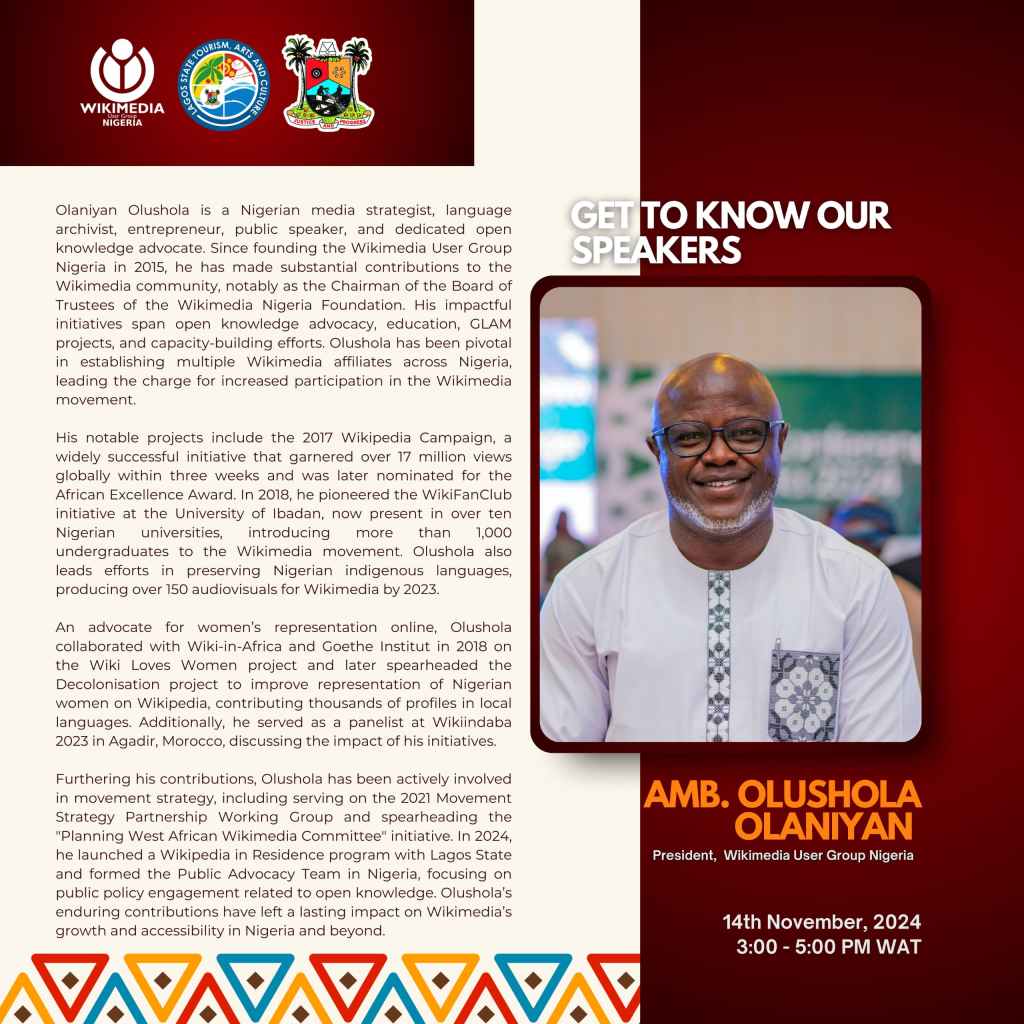
“We document what Nigerians stand for—our heritage, our languages, our people, and our traditions—to domesticate the Nigerian story in a balanced and better perspective for the world to digest,” he remarked.
Ambassador Olaniyan also shared the innovative approach of integrating QR codes into Lagos’ heritage sites. These codes, linked to Wikipedia pages, will provide visitors instant access to the history and significance of these locations. He emphasized the potential of this initiative to empower local youth, not just in Lagos but across Nigeria, and to engage Wikimedia communities worldwide in amplifying Lagos’ visibility.
Pelu Awofeso: Showcasing Lagos as a Hub of Creativity and Culture, Award-winning travel writer Pelu Awofeso lauded the initiative as a historic move towards highlighting Lagos’ cultural and historical treasures.
“This is the very first time any organization, private or public, is deliberately focusing on trying to document the cultural and historical assets of Lagos,” he said.
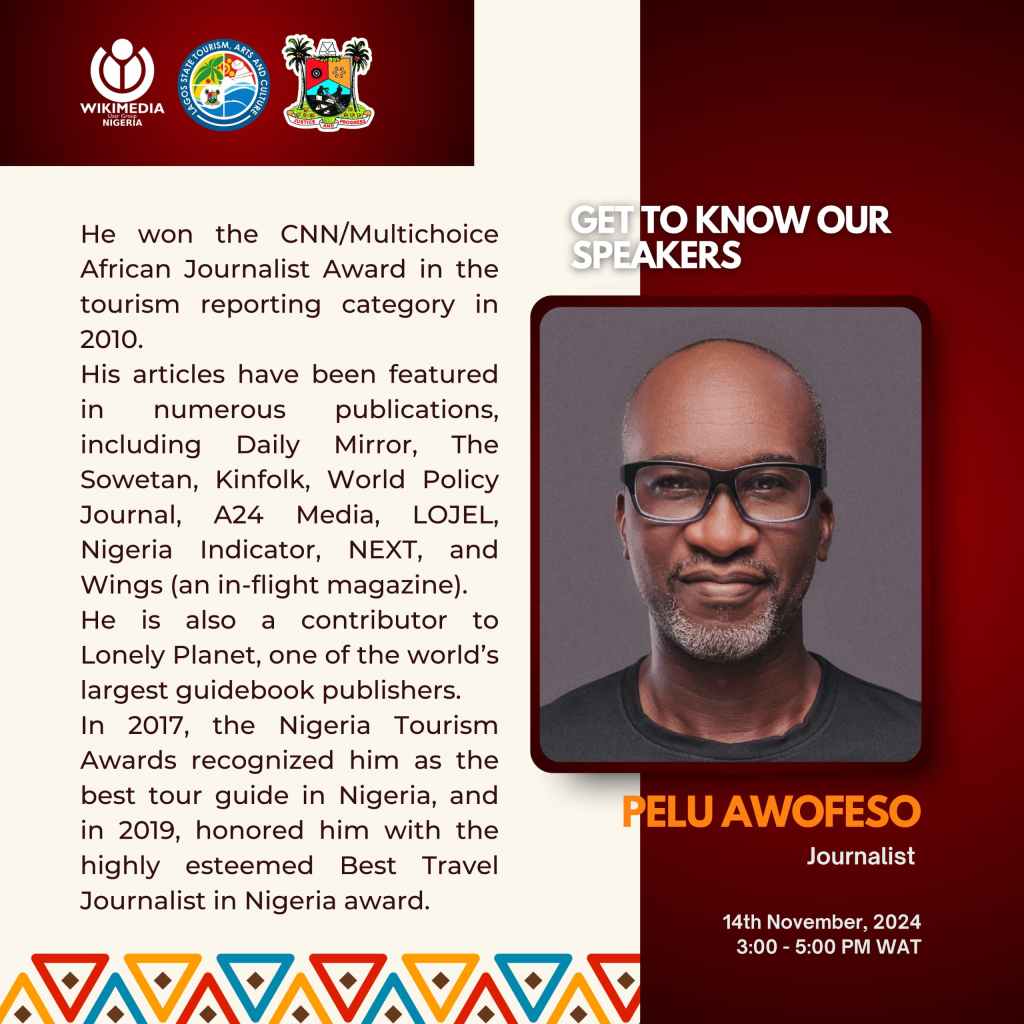
He noted that Lagos has always been a magnet for people, owing to its vibrancy in commerce, entertainment, and creativity. Highlighting Lagos’ unique art seasons, Awofeso said: “From October’s creative arts season to December’s entertainment boom, Lagos is alive with festivals, exhibitions, and concerts. It is a city where culture and commerce intersect seamlessly.”
Awofeso also pointed out a significant challenge: the lack of accessibility to many heritage and nature parks in Lagos. “While Lagos boasts dozens of parks and cultural sites, most people don’t know about them, and even fewer can access them. Wikimedia’s work in digital documentation can help address these gaps by shedding light on lesser-known sites and improving public awareness.”
Okorie Uguru: Media as a Catalyst for Tourism. Publisher Okorie Uguru emphasized the critical role the media has played and continues to play in promoting Lagos’ tourism.
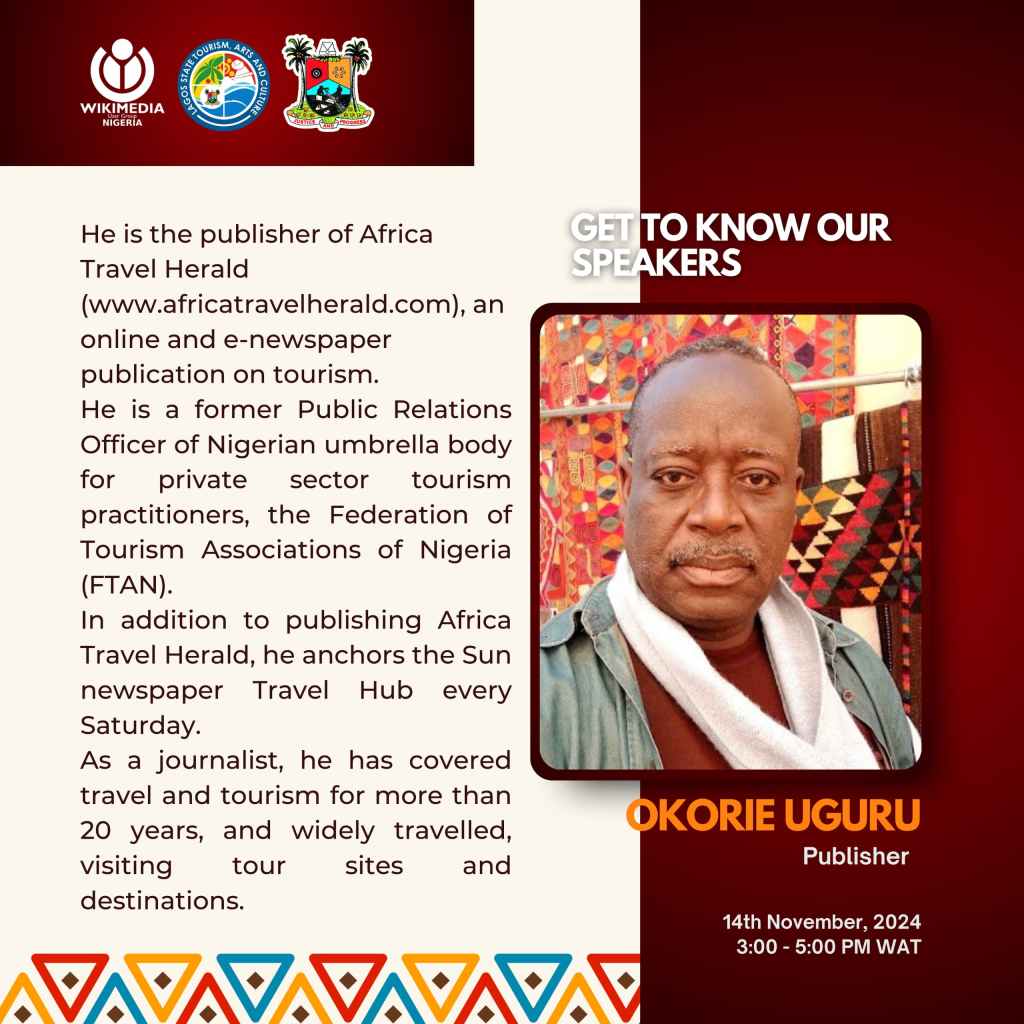
“You can’t promote tourism without the media, as tourism products are experiences people must hear about first before considering them. For decades, the media has been at the forefront of documenting Lagos’ beaches, heritage sites, and cultural events.”
He underscored the need to digitize archival stories, as much of Lagos’ history has been preserved in print but remains inaccessible online. He called on Wikimedia to engage experienced journalists and tap into their wealth of unpublished work to enrich the digital documentation of Lagos’ tourism assets.
Melvin Iteghete: Bridging Gaps Through Technology. Tech expert Melvin Iteghete highlighted how technology has transformed the way people explore heritage.
“Platforms like Wikipedia serve as bridges, enabling people worldwide to explore lesser-known sites through digital documentation. Initiatives like this partnership between the Lagos State Government and Wikimedia User Group Nigeria are pivotal in promoting sustainable tourism development.”
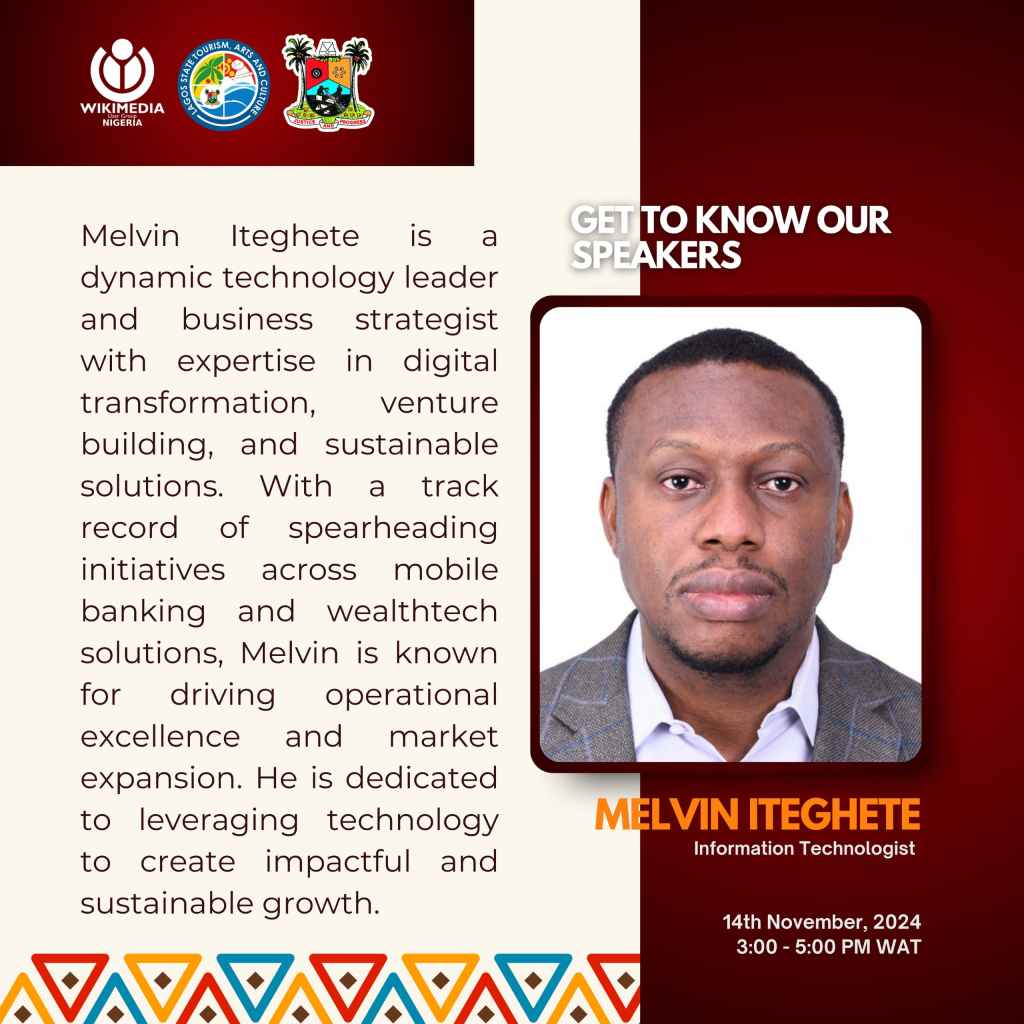
Mrs. Adetoke Benson-Awoyinka: The Honourable Commissioner from the Lagos State Ministry of Tourism, Arts, and Culture praised the collaboration with Wikimedia as a strategic step in preserving Lagos’ tourist sites.
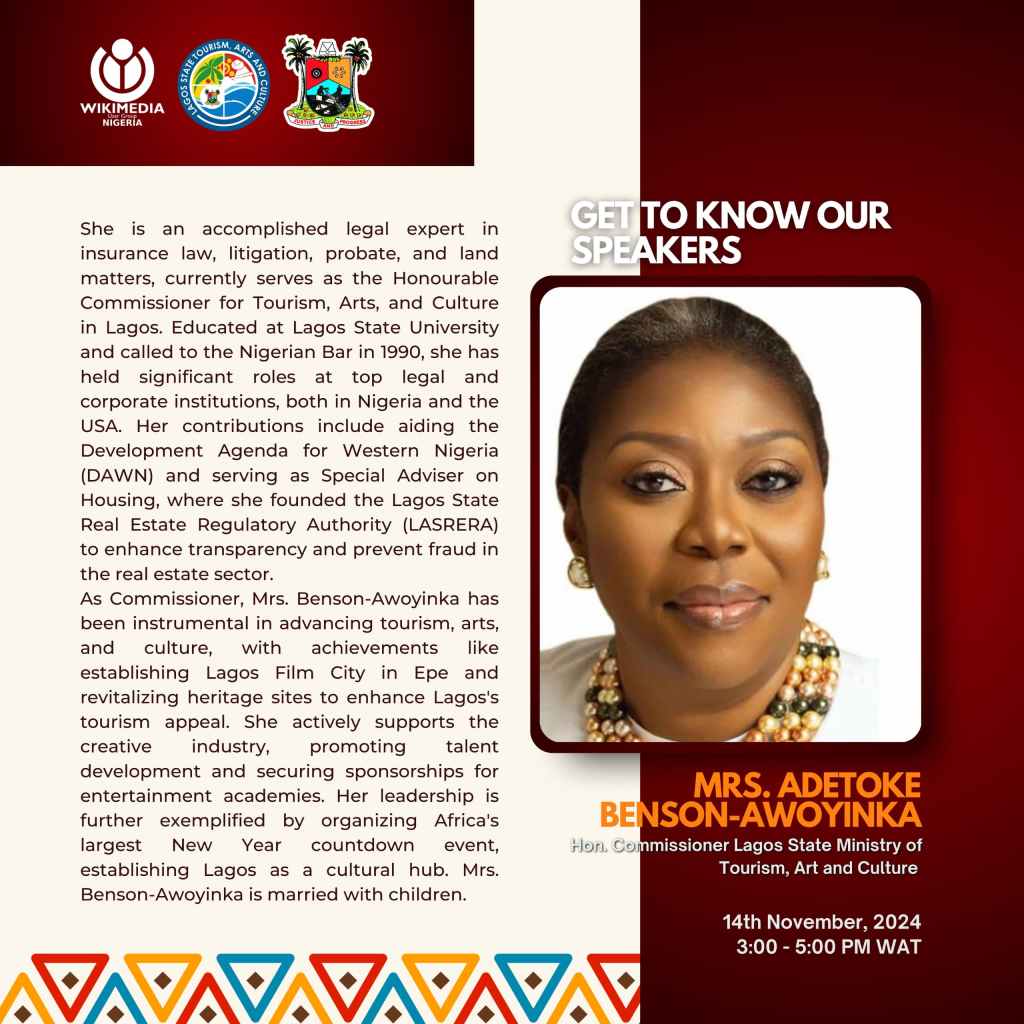
“Journalists have a medium that we do not have because journalism is everywhere and it is global. Their role in amplifying the beauty of our tourism sites is invaluable. This partnership with Wikimedia User Group Nigeria is critical for digitally preserving Lagos State’s tourist sites and ensuring that the world can access and appreciate our cultural heritage,” the Commissioner said.
The Ministry has been identifying key tourist sites and installing plaques with essential details about their history and significance. These efforts, combined with Wikimedia’s technological expertise, promise to revolutionize how Lagos’ heritage is experienced by locals and visitors alike.
The event concluded after a photo session, with closing remarks from Barakat, thanking attendees and panelists for their participation and reiterating the importance of documenting Lagos’ cultural identity. Participants were encouraged to join the writing contest and leverage their work to enrich Lagos’ representation on Wikipedia.
As Lagos continues to grow as a cultural hub, the Wiki Imagine Lagos Initiative serves as a vital platform to amplify its stories and preserve its legacy for generations to come.
You can watch the recorded Facebook live session here. For more information about the Wiki Imagine Lagos project, visit our Meta page. You can also follow us on Facebook, Instagram, and X at @wikiimaginelagos to stay tuned for our next steps.
In September, 6,000 community members from more than 180 communities cast their vote in the 2024 Wikimedia Foundation Board Elections. The elections were held to fill four community-and-affiliate-selected spots on the Foundation’s Board of Trustees. They resulted in the selection of two first-time Trustees–Maciej Artur Nadzikiewicz and Christel Steigenberger–as well as two returning Trustees–Dr. Victoria Doronina and Lorenzo Losa. The Board includes both members selected by the Wikimedia communities and board-selected members who collectively volunteer their time to provide oversight to the Wikimedia Foundation.
The Board has now completed its due diligence review on the selected Trustees, and all have officially been appointed to the Board. We’d like to congratulate the four selected Trustees and share a bit about first-time Trustees Maciej and Christel.
“..At our last [Board] meeting on December 11, we welcomed Maciej and Christel, veteran community members who bring their experience as volunteers and community leaders, as well as their commitment to our shared mission of free knowledge. We also appointed Lorenzo and Victoria to another term and appreciate the experience and continuity they will also provide to the Board.”
– Nataliia Tymkiv, Chair of the Board of Trustees
Maciej Nadzikiewicz is an editor, organizer, and activist with extensive experience in governance within the Wikimedia movement, including his past roles as a member of the Wikimedia Poland Governance Board, an administrator of Polish Wikipedia, and as a Board member and Secretary for Wikimedia Europe. Most recently, Maciej led the core organizing team of Wikimania 2024, which took place in his home country of Poland. Outside of the Wikimedia movement, Maciej has been a member of the Working Group on Artificial Intelligence, Internet of Things, and Disruptive Technologies at the Polish Ministry of Digital Affairs since 2023.
“We are at a pivotal time in the evolution of the internet, and I believe it is more important than ever to ensure that the Wikimedia projects continue to be relevant in this new era. I want to bring my experience as a Wikimedian, leader, community organizer, and member of the first digital generation to guide the organization and the movement on how we can best support our users and volunteers while growing and curating knowledge on the Wikimedia projects.”
– Maciej Nadzikiewicz
Christel Steigenberger is a Wikimedia volunteer administrator, social activist, and community organizer. She started her journey as a Wikimedian in 2014 on the German-language Wikipedia, where she served as an administrator from 2015–2018. In 2023, Christel was granted administrator rights on Wikimedia Commons, where much of her volunteer work is now focused. Christel also previously worked at the Wikimedia Foundation in both Trust and Safety and community support roles. Currently, Christel is working in social work as a Social Pedagogue supporting patients with mental health issues.
“My journey in the Wikimedia movement started as a volunteer, continued as a staff member at the Wikimedia Foundation, and now as a Trustee of the Board. I find joy in contributing to this ‘best place on the internet,’ and I want to bring to the Board my focus on closing knowledge gaps, attracting and supporting contributors from around the world, and helping the Wikimedia projects to stay technologically fit and ready for the future.”
– Christel Steigenberger
Christel and Maciej have terms that will run until December 2027. Current Trustees, Dr. Victoria Doronina and Lorenzo Losa, have been reappointed to the Board for another term, which also runs through December 2027.
The Board thanks its two departing members, Dr. Dariusz Jemielniak and Rosie Stephenson-Goodknight, for their service and contributions. The next Wikimedia Foundation Board selection process will take place in 2025.
Want to know more about the Wikimedia Foundation Board of Trustees? Check out this short informational video or visit the Board’s page on Meta-Wiki.
Today, the Wikimedia Foundation, the global nonprofit that hosts Wikipedia, announced that two new members have joined its Board of Trustees: Maciej Artur Nadzikiewicz and Christel Steigenberger. In addition, current community-and-affiliate selected Trustees Dr. Victoria Doronina and Lorenzo Losa have also been reappointed to the Board for another term. The Wikimedia Foundation Board of Trustees includes both community-selected volunteers and board-selected members who collectively provide governance and oversight to the Foundation.
“In this year’s Board selection process, 6000 members of the Wikimedia movement from more than 180 communities cast their vote. As a result, at our last meeting on December 11, we welcomed Maciej and Christel, veteran community members who bring their experience as volunteers and community leaders, as well as their commitment to our shared mission of free knowledge. We also appointed Lorenzo and Victoria to another term and appreciate the experience and continuity they will also provide to the Board.” – Nataliia Tymkiv, Chair of the Board of Trustees.
Maciej Nadzikiewicz is an editor, organizer, and activist with extensive experience in governance within the Wikimedia movement, including his past roles as a member of the Wikimedia Poland Governance Board, an administrator of Polish Wikipedia, and as a Board member and Secretary for Wikimedia Europe. Most recently, Maciej led the core organizing team of Wikimania 2024, which took place in his home country of Poland. Outside of the Wikimedia movement, Maciej has been a member of the Working Group on Artificial Intelligence, Internet of Things, and Disruptive Technologies at the Polish Ministry of Digital Affairs since 2023.
“We are at a pivotal time in the evolution of the internet, and I believe it is more important than ever to ensure that the Wikimedia projects continue to be relevant in this new era. I want to bring my experience as a Wikimedian, leader, community organizer, and member of the first digital generation to guide the organization and the movement on how we can best support our users and volunteers while growing and curating knowledge on the Wikimedia projects.” – Maciej Nadzikiewicz
Christel Steigenberger is a Wikimedia volunteer administrator, social activist, and community organizer. She started her journey as a Wikimedian in 2014 on the German-language Wikipedia, where she served as an administrator from 2015–2018. In 2023, Christel was granted administrator rights on Wikimedia Commons, where much of her volunteer work is now focused. Christel also previously worked at the Wikimedia Foundation in both Trust and Safety and community support roles. Currently, Christel is working in social work as a Social Pedagogue supporting patients with mental health issues.
“My journey in the Wikimedia movement started as a volunteer, continued as a staff member at the Wikimedia Foundation, and now as a Trustee of the Board. I find joy in contributing to this ‘best place on the internet,’ and I want to bring to the Board my focus on closing knowledge gaps, attracting and supporting contributors from around the world, and helping the Wikimedia projects to stay technologically fit and ready for the future.” – Christel Steigenberger
Christel and Maciej have terms that will run until December 2027. Also, as part of the selection, current Trustees, Dr. Victoria Doronina and Lorenzo Losa have been reappointed to the Board for another term, which also runs through December 2027.
The Board thanks its two departing members, Dr. Dariusz Jemielniak and Rosie Stephenson-Goodknight, for their service and contributions. The next Wikimedia Foundation Board selection process will take place in 2025.
Want to know more about the Wikimedia Foundation Board of Trustees? Check out this short informational video or visit the Board’s page on Meta-Wiki.
The post The Wikimedia Foundation welcomes community-and-affiliate selected trustees appeared first on Wikimedia Foundation.
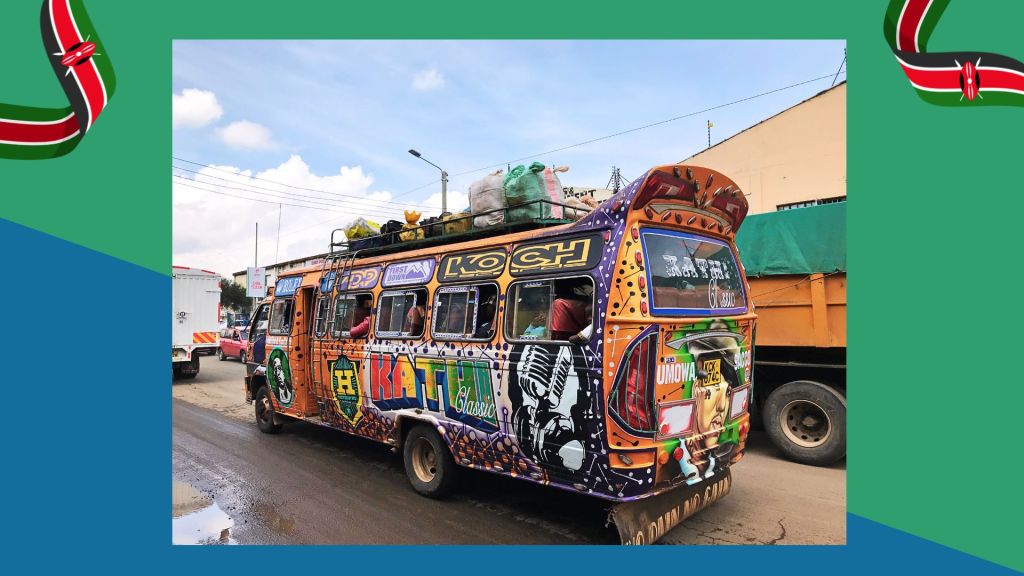
Wikimania is turning 20, and what better way to celebrate than
by coming together in Nairobi, Kenya? This milestone
anniversary promises not just a journey through two decades of
gatherings but also a chance to experience the vibrant culture and
innovation of East Africa for the
first time in Wikimania history.
Every Wikimania has its own flavor, but this one is shaping up to
be extra special.
The setting couldn’t be more fitting. Nairobi, known as the
“Silicon
Savannah,” is a lively city buzzing with energy and creativity.
Home to a thriving tech scene, it’s the perfect place to celebrate
the legacy of a forward-thinking movement.
If you’re looking forward to Wikimania as much as we are, it’s time to start planning. Whether you’re an experienced traveler or setting off for the first time, a little prep can go a long way. So, let’s talk travel essentials and insider tips to help you make the most of this experience.
The main gateway to Kenya is Jomo Kenyatta International Airport (JKIA), just a quick 15-minute drive from Nairobi’s city center. But it’s not your only option. For those looking to soak up Kenya’s coastal beauty first, Moi International Airport in Mombasa (MBA) is a great alternative. The national airline is Kenya Airways (KQ), which flies to all major destinations in and out of Africa.
In case you are traveling from neighboring countries in the region, you can consider buses from Easy Coach and Tahmeed that connect Nairobi to major African cities like Kampala, Dar es Salaam, and Kigali.
Now, here’s some great news: Kenya has abolished visa
requirements for all foreign visitors for stays up to 90 days. But
all travelers, with the exception of East African citizens, are
required to apply for the Electronic Travel Authorization
(ETA) —it’s easy to apply online and approval is fast, no
embassy visit required. You do need to apply at least 72 hours
before your trip. As you start the application, don’t forget to
double-check that your passport is valid for at least 6 months, and
once you receive your eVisa keep a copy handy.
You’ll also need to show a Yellow Fever vaccination
certificate if you are traveling from an endemic region. The
certificate needs to be obtained at least 10 to 15 days before
departure. While you’re at it, also confirm that your routine
vaccinations are up to date, including Hepatitis A, Typhoid,
Tetanus, and if you’re planning wildlife activities, consider
Rabies as well.
Nairobi offers a wide range of accommodation options, from luxury to budget – there’s something for everyone. If you want to be close to the Wikimania action, plan to stay around the Gigiri, or Westlands areas. They check all the boxes: they are safe, well connected, and close to Wikimania.

There are plenty of ways to get around. For ride-hailing, apps
like Uber and Little Cab are reliable and affordable, but here’s a
tip: skip the economy options like Uber Chap Chap. The cars are
sometimes in rough shape and the drivers might not always deliver
the best experience. Instead, choose Comfort or UberX for a
smoother ride. The same goes for Little Cab—stick to their
‘Comfort’ option rather than ‘economy’ for better service.
If you want to travel like a local, the boldly decorated matatus
(minibuses) are a beloved staple. They’re fun to experience but can
be a bit overwhelming for first-timers, especially since some
routes are hotspots for pickpockets. It’s best to try them when
accompanied by local Wikimedians who know the ropes.
Motorcycle taxis, or boda bodas, are a quick way to dodge Nairobi’s notorious traffic, but if you’re unfamiliar with the city, it’s better to avoid them unless you’re with someone experienced.

And finally, walking. While daytime strolls in busy areas are generally safe, avoid walking alone at night or covering long distances on foot. Nairobi is largely safe for both locals and visitors, but like any big city, certain areas require a bit more caution. Muggings and pickpocketing can happen, especially in the bustling downtown areas. It’s best to avoid Nairobi downtown and limit your movements in the Central Business District if you ever find the need to check out the city center.
In August, Kenya is at its coolest and driest weather—perfect for exploring! In Nairobi, expect daytime highs of around 24°C (75°F) and cozy nighttime lows near 14°C (57°F). There’s minimal rain and about 7 glorious hours of sunshine every day. Don’t forget to pack some layers for those crisp mornings and evenings—a light jacket or a sweater will be your best friend.
Oh, and while you’re packing, toss in an electricity adapter. Kenya uses the Type G plug, with three rectangular pins in a triangular layout. The voltage is 240V, 50Hz, so confirm that your devices are compatible.
While Nairobi isn’t in a malaria-prone area, it’s still a good idea to pack some mosquito repellent, just in case. If you’re planning to visit other parts of Kenya, check to see where malaria is prevalent and speak with your doctor about getting malaria tablets.
Bringing some local currency is also a smart move—perfect for buying that cute souvenir or tipping a helpful guide. If you’ve got time before your trip, swing by your bank and grab some Kenyan Shillings (KES). If that’s not an option, no worries. Let us introduce you to a local favorite: M-Pesa, Kenya’s wildly popular mobile money platform. It’s a must-have for payments, and essential to download before your trip. Major credit cards like Visa and Mastercard are accepted in larger establishments, but having some cash or an M-Pesa for smaller transactions will make things much easier.
For more on how to make the most of your time in Kenya, read the travel
guide the Wikimania 2025 Core Organizing Team has prepared for
you – it’s packed with insider tips to help you dive into the local
scene and make the most of your experience.
Karibu Nairobi – see you there!
As we wrap out a transformative year, let’s celebrate the progress Codex, the design system for Wikimedia, has made. From user-centric design enhancements to foundational upgrades that empower teams and volunteers for our global user reach.
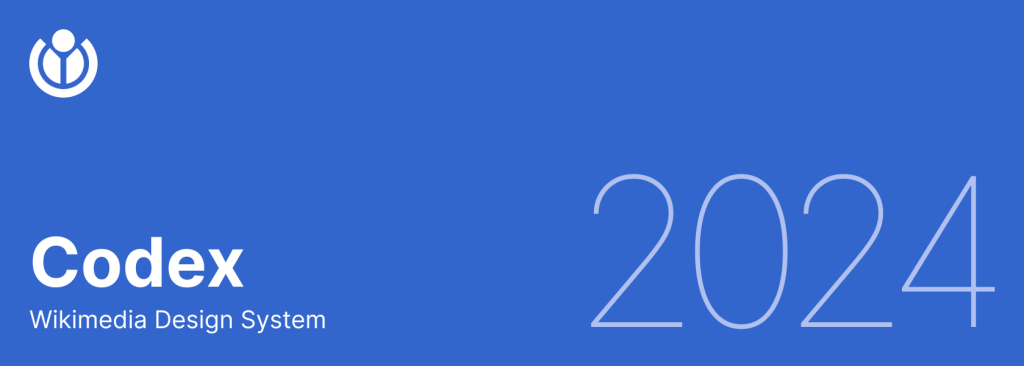
This year, the Wikimedia Foundation Design System
Team has had the pleasure of welcoming many new contributors,
from various teams within the Foundation to volunteers from around
the world.
We saw significant contributions from both designers and developers
alike, which have been instrumental in advancing Codex’s
capabilities. These include enhancements like internationalization
system, Codex PHP, native constraint validation, and the addition
of various design tokens for expanded color palette and dark mode,
new components like Table, and icons.
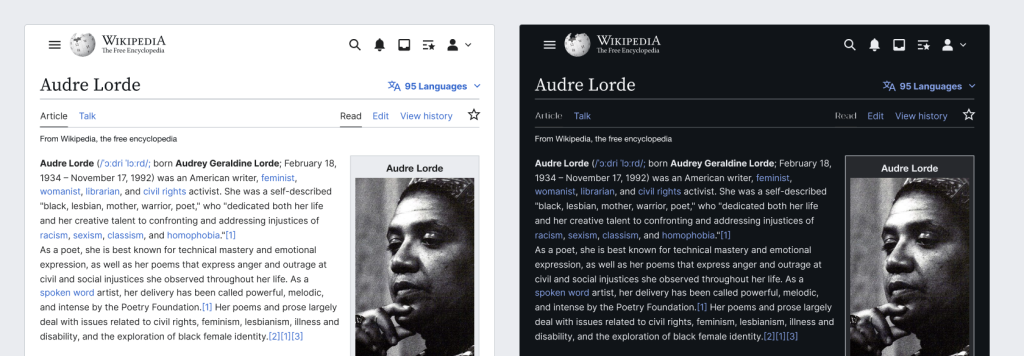
This year, Codex played a pivotal role in powering transformative projects across teams, showcasing its versatility and impact:
Dark Mode in Vector and MinervaNeue
Leveraging Codex’s enhanced design tokens and CSS variable infrastructure, the Web Team delivered a seamless dark mode experience in Vector 22 and MinervaNeue, the default desktop and mobile skins of English Wikipedia and many more wiki projects, ensuring aesthetic and functional parity across modes.
Community Configuration 2.0
The Growth Team harnessed Codex components to elevate user workflows in Community Configuration 2.0, offering a more intuitive and visually engaging interface for helping communities customize wiki features to meet their unique needs.
Collaboration List
Codex’s
flexibility enabled the Campaigns Team to craft an
accessible and cohesive interface for the new Collaboration
List feature, empowering users to track, filter, and manage
shared campaigns effortlessly.
Multiblocks
Still in progress, the Multiblocks project by the CommTech Team is shaping up to allow admins to create multiple, overlapping blocks on a single user. Codex’s foundational components and responsive styles are central to its streamlined, user-friendly design.
Migration of Mismatch Finder and Special: NewLexeme from WiKit to Codex
As part of the initiative to consolidate design systems,
Wikimedia Deutschland’s migration team successfully
transitioned Wikit-based tools to Codex, improving
maintainability and aligning them with the latest design
standards.
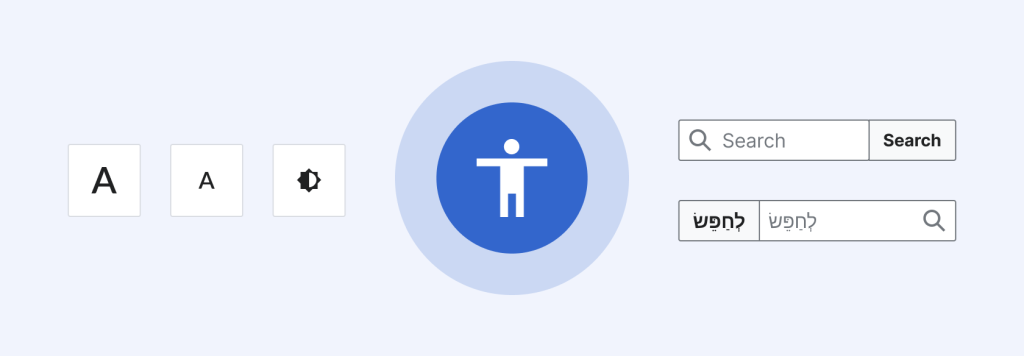
As always, the Design System Team prioritizes accessibility, inclusivity and usability in designing and developing Codex.
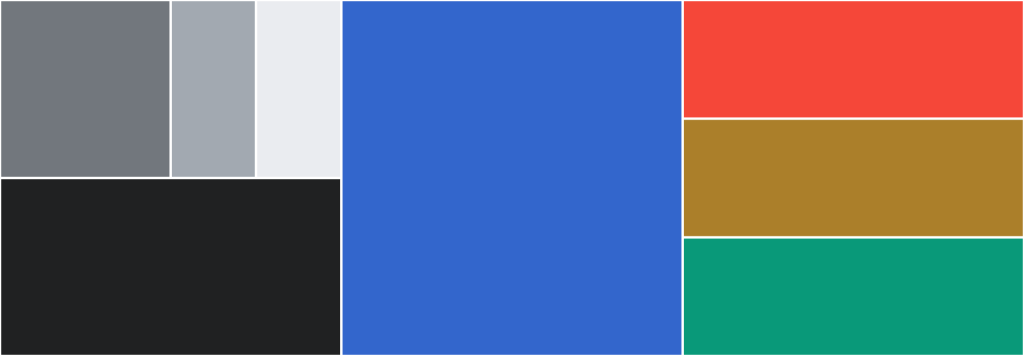
Codex achieved fully supporting dark mode with parity to light mode through CSS variables embedded in design tokens, empowering teams to deliver one of the biggest user-experience rollouts this year, enabling dark mode on Wikipedia and sibling projects using Vector 2022 skin.
In sequence of introducing the modes, a substantial amendment and
expansion of the color palette took place, providing more
intentional hues which enabled more flexibility for designers and
helped address
long-standing accessibility and design debt.
Progressive design refinements were made in almost all Codex components for subtle yet impactful visual cues.

Spearheaded by volunteer developer Doğu Abaris, we’ve collaboratively created a standalone PHP library for Codex markup generation as another piece of the Design System – Codex PHP. This library greatly streamlines the process of building complex Codex-based UIs that don’t require JavaScript.
Codex’s codebase became more maintainable and forward-looking with:
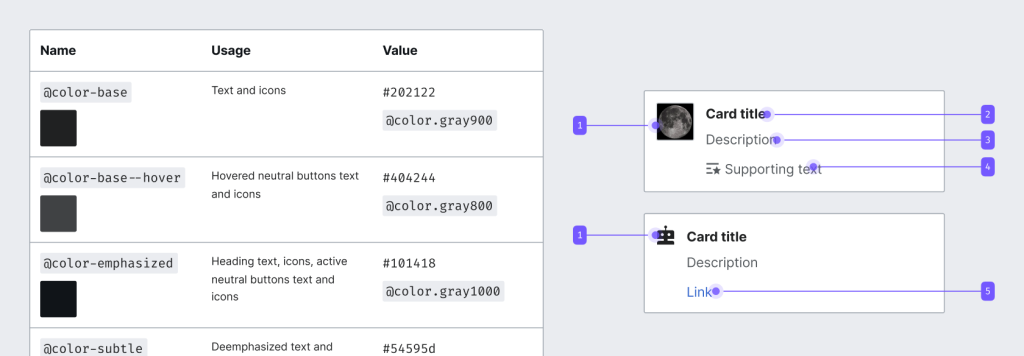
Documentation saw a major overhaul, emphasizing transparency and ease of onboarding:

The addition of numerous icons underscored Codex’s commitment to universality and usability. These lightweight, versatile assets complemented improvements in accessibility and aesthetic consistency.
The groundwork laid this year positions Codex for an exciting year ahead, with version 2.0 on the horizon:
We’d like to thank once more our global volunteers and peers for their relentless focus on innovation, collaboration, and excellence. Together, we are shaping a design system that not only meets the needs of today but anticipates the challenges of tomorrow.
Looking ahead to 2025, Codex 2.0 promises even greater integration, expanded components, and tools to empower Wikimedia projects with consistent, user-centered design.
Subscriptions
| Feed | RSS | Last fetched | Next fetched after |
|---|---|---|---|
| [[WM:TECHBLOG]] | XML | Monday, 30 December 2024 17:01 | Monday, 30 December 2024 18:01 |
| All Things Linguistic | XML | Monday, 30 December 2024 17:01 | Monday, 30 December 2024 18:01 |
| Andy Mabbett, aka pigsonthewing. | XML | Monday, 30 December 2024 17:01 | Monday, 30 December 2024 18:01 |
| Anna writes | XML | Monday, 30 December 2024 17:01 | Monday, 30 December 2024 18:01 |
| BaChOuNdA | XML | Monday, 30 December 2024 17:01 | Monday, 30 December 2024 18:01 |
| Bawolff's rants | XML | Monday, 30 December 2024 17:01 | Monday, 30 December 2024 18:01 |
| Between the Brackets: a MediaWiki Podcast | XML | Monday, 30 December 2024 17:01 | Monday, 30 December 2024 18:01 |
| Blog on Taavi Väänänen | XML | Monday, 30 December 2024 17:01 | Monday, 30 December 2024 18:01 |
| Blogs on Santhosh Thottingal | XML | Monday, 30 December 2024 17:01 | Monday, 30 December 2024 18:01 |
| Bookcrafting Guru | XML | Monday, 30 December 2024 17:01 | Monday, 30 December 2024 18:01 |
| brionv | XML | Monday, 30 December 2024 17:01 | Monday, 30 December 2024 18:01 |
| Catching Flies | XML | Monday, 30 December 2024 17:01 | Monday, 30 December 2024 18:01 |
| Clouds & Unicorns | XML | Monday, 30 December 2024 17:01 | Monday, 30 December 2024 18:01 |
| Cogito, Ergo Sumana tag: Wikimedia | XML | Monday, 30 December 2024 17:01 | Monday, 30 December 2024 18:01 |
| Cometstyles.com | XML | Monday, 30 December 2024 17:01 | Monday, 30 December 2024 18:01 |
| Commonists | XML | Monday, 30 December 2024 17:01 | Monday, 30 December 2024 18:01 |
| Content Translation Update | XML | Monday, 30 December 2024 17:01 | Monday, 30 December 2024 18:01 |
| cookies & code | XML | Monday, 30 December 2024 17:01 | Monday, 30 December 2024 18:01 |
| Damian's Dev Blog | XML | Monday, 30 December 2024 17:01 | Monday, 30 December 2024 18:01 |
| Design at Wikipedia | XML | Monday, 30 December 2024 17:01 | Monday, 30 December 2024 18:01 |
| dialogicality | XML | Monday, 30 December 2024 17:01 | Monday, 30 December 2024 18:01 |
| Diff | XML | Monday, 30 December 2024 17:01 | Monday, 30 December 2024 18:01 |
| Doing the needful | XML | Monday, 30 December 2024 17:01 | Monday, 30 December 2024 18:01 |
| Durova | XML | Monday, 30 December 2024 17:01 | Monday, 30 December 2024 18:01 |
| Ed's Blog | XML | Monday, 30 December 2024 17:01 | Monday, 30 December 2024 18:01 |
| Einstein University | XML | Monday, 30 December 2024 17:01 | Monday, 30 December 2024 18:01 |
| Endami | XML | Monday, 30 December 2024 17:01 | Monday, 30 December 2024 18:01 |
| English Wikipedia administrators' newsletter | XML | Monday, 30 December 2024 17:01 | Monday, 30 December 2024 18:01 |
| Fae | XML | Monday, 30 December 2024 17:01 | Monday, 30 December 2024 18:01 |
| Federico Leva | XML | Monday, 30 December 2024 17:01 | Monday, 30 December 2024 18:01 |
| FOSS – Small Town Tech | XML | Monday, 30 December 2024 17:01 | Monday, 30 December 2024 18:01 |
| Gap-finding Project | XML | Monday, 30 December 2024 17:01 | Monday, 30 December 2024 18:01 |
| Geni's Wikipedia Blog | XML | Monday, 30 December 2024 17:01 | Monday, 30 December 2024 18:01 |
| http://ad.huikeshoven.org/feeds/posts/default/-/wiki | XML | Monday, 30 December 2024 17:01 | Monday, 30 December 2024 18:01 |
| http://blog.maudite.cc/comments/feed | XML | Monday, 30 December 2024 17:01 | Monday, 30 December 2024 18:01 |
| http://blog.pediapress.com/feeds/posts/default/-/wiki | XML | Monday, 30 December 2024 17:01 | Monday, 30 December 2024 18:01 |
| http://blog.robinpepermans.be/feeds/posts/default/-/PlanetWM | XML | Monday, 30 December 2024 17:01 | Monday, 30 December 2024 18:01 |
| http://bluerasberry.com/feed/ | XML | Monday, 30 December 2024 17:01 | Monday, 30 December 2024 18:01 |
| http://brianna.modernthings.org/atom/?section=article | XML | Monday, 30 December 2024 17:01 | Monday, 30 December 2024 18:01 |
| http://feeds.feedburner.com/ThoughtsForDeletion^ | XML | Monday, 30 December 2024 17:01 | Monday, 30 December 2024 18:01 |
| http://magnusmanske.de/wordpress/?feed=rss2 | XML | Monday, 30 December 2024 17:01 | Monday, 30 December 2024 18:01 |
| http://moriel.smarterthanthat.com/tag/mediawiki/feed/ | XML | Monday, 30 December 2024 17:01 | Monday, 30 December 2024 18:01 |
| http://terrychay.com/category/work/wikimedia/feed | XML | Monday, 30 December 2024 17:01 | Monday, 30 December 2024 18:01 |
| http://wikipediaweekly.org/feed/podcast | XML | Monday, 30 December 2024 17:01 | Monday, 30 December 2024 18:01 |
| http://www.greenman.co.za/blog/?tag=wikimedia&feed=rss2 | XML | Monday, 30 December 2024 17:01 | Monday, 30 December 2024 18:01 |
| http://www.phoebeayers.info/phlog/?cat=10&feed=rss2 | XML | Monday, 30 December 2024 17:01 | Monday, 30 December 2024 18:01 |
| https://blog.ash.bzh/en/feed/ | XML | Monday, 30 December 2024 17:01 | Monday, 30 December 2024 18:01 |
| https://blog.bluespice.com/tag/mediawiki/feed/ | XML | Monday, 30 December 2024 17:01 | Monday, 30 December 2024 18:01 |
| https://blog.kevinpayravi.com/tag/wikimedia/feed/ | XML | Monday, 30 December 2024 17:01 | Monday, 30 December 2024 18:01 |
| https://blog.wikimedia.de/tag/Wikidata+English/feed/ | XML | Monday, 30 December 2024 17:01 | Monday, 30 December 2024 18:01 |
| https://hexmode.com/category/wmf/feed/atom/ | XML | Monday, 30 December 2024 17:01 | Monday, 30 December 2024 18:01 |
| https://logic10.tumblr.com/ | XML | Monday, 30 December 2024 17:01 | Monday, 30 December 2024 18:01 |
| https://lu.is/wikimedia/feed/ | XML | Monday, 30 December 2024 17:01 | Monday, 30 December 2024 18:01 |
| https://mariapacana.tumblr.com/tagged/parsoid/rss | XML | Monday, 30 December 2024 17:01 | Monday, 30 December 2024 18:01 |
| https://medium.com/feed/@nehajha | XML | Monday, 30 December 2024 17:01 | Monday, 30 December 2024 18:01 |
| https://thewikipedian.net/feed/ | XML | Monday, 30 December 2024 17:01 | Monday, 30 December 2024 18:01 |
| https://tttwrites.wordpress.com/category/wikimedia/feed/ | XML | Monday, 30 December 2024 17:01 | Monday, 30 December 2024 18:01 |
| https://wandacode.com/category/outreachy-internship/feed/ | XML | Monday, 30 December 2024 17:01 | Monday, 30 December 2024 18:01 |
| https://wikistrategies.net/category/wiki/feed/atom/ | XML | Monday, 30 December 2024 17:01 | Monday, 30 December 2024 18:01 |
| https://wllm.com/tag/wikipedia/feed/ | XML | Monday, 30 December 2024 17:01 | Monday, 30 December 2024 18:01 |
| https://www.guillaumepaumier.com/category/wikimedia/feed/ | XML | Monday, 30 December 2024 17:01 | Monday, 30 December 2024 18:01 |
| https://www.residentmar.io/feed | XML | Monday, 30 December 2024 17:01 | Monday, 30 December 2024 18:01 |
| https://www.wikiphotographer.net/category/wikimedia-commons/feed/ | XML | Monday, 30 December 2024 17:01 | Monday, 30 December 2024 18:01 |
| in English Archives - Wikimedia Suomi | XML | Monday, 30 December 2024 17:01 | Monday, 30 December 2024 18:01 |
| International Wikitrekk | XML | Monday, 30 December 2024 17:01 | Monday, 30 December 2024 18:01 |
| Language and Translation | XML | Monday, 30 December 2024 17:01 | Monday, 30 December 2024 18:01 |
| Laura Hale, Wikinews reporter | XML | Monday, 30 December 2024 17:01 | Monday, 30 December 2024 18:01 |
| Leave it to the prose | XML | Monday, 30 December 2024 17:01 | Monday, 30 December 2024 18:01 |
| Make love, not traffic. | XML | Monday, 30 December 2024 17:01 | Monday, 30 December 2024 18:01 |
| Mark Rauterkus & Running Mates ponder current events | XML | Monday, 30 December 2024 17:01 | Monday, 30 December 2024 18:01 |
| MediaWiki and Wikimedia – etc. etc. | XML | Monday, 30 December 2024 17:01 | Monday, 30 December 2024 18:01 |
| MediaWiki Testing | XML | Monday, 30 December 2024 17:01 | Monday, 30 December 2024 18:01 |
| MediaWiki – addshore | XML | Monday, 30 December 2024 17:01 | Monday, 30 December 2024 18:01 |
| MediaWiki – Chris Koerner | XML | Monday, 30 December 2024 17:01 | Monday, 30 December 2024 18:01 |
| mediawiki – Hexmode's Weblog | XML | Monday, 30 December 2024 17:01 | Monday, 30 December 2024 18:01 |
| MediaWiki – It rains like a saavi | XML | Monday, 30 December 2024 17:01 | Monday, 30 December 2024 18:01 |
| MediaWiki – Ryan D Lane | XML | Monday, 30 December 2024 17:01 | Monday, 30 December 2024 18:01 |
| Ministry of Wiki Affairs | XML | Monday, 30 December 2024 17:01 | Monday, 30 December 2024 18:01 |
| Muddyb Mwanaharakati | XML | Monday, 30 December 2024 17:01 | Monday, 30 December 2024 18:01 |
| Musings of Majorly | XML | Monday, 30 December 2024 17:01 | Monday, 30 December 2024 18:01 |
| My Outreachy 2017 @ Wikimedia Foundation | XML | Monday, 30 December 2024 17:01 | Monday, 30 December 2024 18:01 |
| NonNotableNatterings | XML | Monday, 30 December 2024 17:01 | Monday, 30 December 2024 18:01 |
| Notes from the Bleeding Edge | XML | Monday, 30 December 2024 17:01 | Monday, 30 December 2024 18:01 |
| Nothing three | XML | Monday, 30 December 2024 17:01 | Monday, 30 December 2024 18:01 |
| Okinovo okýnko | XML | Monday, 30 December 2024 17:01 | Monday, 30 December 2024 18:01 |
| Open Codex | XML | Monday, 30 December 2024 17:01 | Monday, 30 December 2024 18:01 |
| Open Source Exile | XML | Monday, 30 December 2024 17:01 | Monday, 30 December 2024 18:01 |
| Original Research | XML | Monday, 30 December 2024 17:01 | Monday, 30 December 2024 18:01 |
| Pablo Garuda | XML | Monday, 30 December 2024 17:01 | Monday, 30 December 2024 18:01 |
| Pau Giner | XML | Monday, 30 December 2024 17:01 | Monday, 30 December 2024 18:01 |
| Personal – The Moon on a Stick | XML | Monday, 30 December 2024 17:01 | Monday, 30 December 2024 18:01 |
| Phabricating Phabricator | XML | Monday, 30 December 2024 17:01 | Monday, 30 December 2024 18:01 |
| Planet Wikimedia Archives - Entropy Wins | XML | Monday, 30 December 2024 17:01 | Monday, 30 December 2024 18:01 |
| Planet Wikimedia – OpenMeetings.org | Announcements | XML | Monday, 30 December 2024 17:01 | Monday, 30 December 2024 18:01 |
| planetwikimedia – copyrighteous | XML | Monday, 30 December 2024 17:01 | Monday, 30 December 2024 18:01 |
| Political Bias on Wikipedia | XML | Monday, 30 December 2024 17:01 | Monday, 30 December 2024 18:01 |
| Posts (#wikimedia) | XML | Monday, 30 December 2024 17:01 | Monday, 30 December 2024 18:01 |
| Professional Wiki Blog | XML | Monday, 30 December 2024 17:01 | Monday, 30 December 2024 18:01 |
| project-green-smw | XML | Monday, 30 December 2024 17:01 | Monday, 30 December 2024 18:01 |
| ProWiki Blog | XML | Monday, 30 December 2024 17:01 | Monday, 30 December 2024 18:01 |
| Ramblings by Paolo on Web2.0, Wikipedia, Social Networking, Trust, Reputation, … | XML | Monday, 30 December 2024 17:01 | Monday, 30 December 2024 18:01 |
| Rock drum | XML | Monday, 30 December 2024 17:01 | Monday, 30 December 2024 18:01 |
| Routing knowledge | XML | Monday, 30 December 2024 17:01 | Monday, 30 December 2024 18:01 |
| Sam Wilson's notebook | XML | Monday, 30 December 2024 17:01 | Monday, 30 December 2024 18:01 |
| Sam Wilson: Wikimedia | XML | Monday, 30 December 2024 17:01 | Monday, 30 December 2024 18:01 |
| Sammy's Blog | XML | Monday, 30 December 2024 17:01 | Monday, 30 December 2024 18:01 |
| Score all the things | XML | Monday, 30 December 2024 17:01 | Monday, 30 December 2024 18:01 |
| Scripts++ | XML | Monday, 30 December 2024 17:01 | Monday, 30 December 2024 18:01 |
| Semantic MediaWiki – news | XML | Monday, 30 December 2024 17:01 | Monday, 30 December 2024 18:01 |
| Sentiments of a Dissident | XML | Monday, 30 December 2024 17:01 | Monday, 30 December 2024 18:01 |
| Stories by Megha Sharma on Medium | XML | Monday, 30 December 2024 17:01 | Monday, 30 December 2024 18:01 |
| Sue Gardner's Blog | XML | Monday, 30 December 2024 17:01 | Monday, 30 December 2024 18:01 |
| Tech News weekly bulletin feed | XML | Monday, 30 December 2024 17:01 | Monday, 30 December 2024 18:01 |
| Technical & On-topic – Mike Baynton’s Mediawiki Dev Blog | XML | Monday, 30 December 2024 17:01 | Monday, 30 December 2024 18:01 |
| The Academic Wikipedian | XML | Monday, 30 December 2024 17:01 | Monday, 30 December 2024 18:01 |
| The Lego Mirror - MediaWiki | XML | Monday, 30 December 2024 17:01 | Monday, 30 December 2024 18:01 |
| The life of James R. | XML | Monday, 30 December 2024 17:01 | Monday, 30 December 2024 18:01 |
| The Signpost | XML | Monday, 30 December 2024 17:01 | Monday, 30 December 2024 18:01 |
| The Speed of Thought | XML | Monday, 30 December 2024 17:01 | Monday, 30 December 2024 18:01 |
| TheDJ writes | XML | Monday, 30 December 2024 17:01 | Monday, 30 December 2024 18:01 |
| This Month in GLAM | XML | Monday, 30 December 2024 17:01 | Monday, 30 December 2024 18:01 |
| Timo Tijhof | XML | Monday, 30 December 2024 17:01 | Monday, 30 December 2024 18:01 |
| Ting's Wikimedia Blog | XML | Monday, 30 December 2024 17:01 | Monday, 30 December 2024 18:01 |
| Tyler Cipriani: blog | XML | Monday, 30 December 2024 17:01 | Monday, 30 December 2024 18:01 |
| Vinitha's blog | XML | Monday, 30 December 2024 17:01 | Monday, 30 December 2024 18:01 |
| weekly – semanario – hebdo – 週刊 – týdeník – Wochennotiz – 주간 – tygodnik | XML | Monday, 30 December 2024 17:01 | Monday, 30 December 2024 18:01 |
| What is going on in Europe? | XML | Monday, 30 December 2024 17:01 | Monday, 30 December 2024 18:01 |
| Wiki Education | XML | Monday, 30 December 2024 17:01 | Monday, 30 December 2024 18:01 |
| Wiki Loves Monuments | XML | Monday, 30 December 2024 17:01 | Monday, 30 December 2024 18:01 |
| Wiki Northeast | XML | Monday, 30 December 2024 17:01 | Monday, 30 December 2024 18:01 |
| Wiki Playtime - Medium | XML | Monday, 30 December 2024 17:01 | Monday, 30 December 2024 18:01 |
| wiki – David Gerard | XML | Monday, 30 December 2024 17:01 | Monday, 30 December 2024 18:01 |
| wiki – Gabriel Pollard | XML | Monday, 30 December 2024 17:01 | Monday, 30 December 2024 18:01 |
| wiki – Our new mind | XML | Monday, 30 December 2024 17:01 | Monday, 30 December 2024 18:01 |
| wiki – stu.blog | XML | Monday, 30 December 2024 17:01 | Monday, 30 December 2024 18:01 |
| wiki – The life on Wikipedia – A Wikignome's perspecive | XML | Monday, 30 December 2024 17:01 | Monday, 30 December 2024 18:01 |
| wiki – Ziko's Blog | XML | Monday, 30 December 2024 17:01 | Monday, 30 December 2024 18:01 |
| wiki-en – [[content|comment]] | XML | Monday, 30 December 2024 17:01 | Monday, 30 December 2024 18:01 |
| Wikibooks News | XML | Monday, 30 December 2024 17:01 | Monday, 30 December 2024 18:01 |
| Wikimedia Australia news | XML | Monday, 30 December 2024 17:01 | Monday, 30 December 2024 18:01 |
| Wikimedia DC Blog | XML | Monday, 30 December 2024 17:01 | Monday, 30 December 2024 18:01 |
| Wikimedia Design Blog | XML | Monday, 30 December 2024 17:01 | Monday, 30 December 2024 18:01 |
| Wikimedia Europe | XML | Monday, 30 December 2024 17:01 | Monday, 30 December 2024 18:01 |
| Wikimedia Foundation | XML | Monday, 30 December 2024 17:01 | Monday, 30 December 2024 18:01 |
| Wikimedia on Kosta Harlan | XML | Monday, 30 December 2024 17:01 | Monday, 30 December 2024 18:01 |
| Wikimedia Security Team | XML | Monday, 30 December 2024 17:01 | Monday, 30 December 2024 18:01 |
| Wikimedia Status - Incident History | XML | Monday, 30 December 2024 17:01 | Monday, 30 December 2024 18:01 |
| Wikimedia Tech News | XML | Monday, 30 December 2024 17:01 | Monday, 30 December 2024 18:01 |
| Wikimedia | ഗ്രന്ഥപ്പുര | XML | Monday, 30 December 2024 17:01 | Monday, 30 December 2024 18:01 |
| wikimedia – andré klapper's blog. | XML | Monday, 30 December 2024 17:01 | Monday, 30 December 2024 18:01 |
| wikimedia – apergos' open musings | XML | Monday, 30 December 2024 17:01 | Monday, 30 December 2024 18:01 |
| wikimedia – Bitterscotch | XML | Monday, 30 December 2024 17:01 | Monday, 30 December 2024 18:01 |
| Wikimedia – DcK Area | XML | Monday, 30 December 2024 17:01 | Monday, 30 December 2024 18:01 |
| wikimedia – Harsh Kothari | XML | Monday, 30 December 2024 17:01 | Monday, 30 December 2024 18:01 |
| Wikimedia – Jan Ainali | XML | Monday, 30 December 2024 17:01 | Monday, 30 December 2024 18:01 |
| wikimedia – millosh’s blog | XML | Monday, 30 December 2024 17:01 | Monday, 30 December 2024 18:01 |
| wikimedia – Open World | XML | Monday, 30 December 2024 17:01 | Monday, 30 December 2024 18:01 |
| wikimedia – Thomas Dalton | XML | Monday, 30 December 2024 17:01 | Monday, 30 December 2024 18:01 |
| Wikimedia – Tim Starling's blog | XML | Monday, 30 December 2024 17:01 | Monday, 30 December 2024 18:01 |
| Wikimedia – Witty's Blog | XML | Monday, 30 December 2024 17:01 | Monday, 30 December 2024 18:01 |
| Wikinews Reports | XML | Monday, 30 December 2024 17:01 | Monday, 30 December 2024 18:01 |
| Wikipedia & Linterweb | XML | Monday, 30 December 2024 17:01 | Monday, 30 December 2024 18:01 |
| Wikipedia - nointrigue.com | XML | Monday, 30 December 2024 17:01 | Monday, 30 December 2024 18:01 |
| Wikipedia Archives — Andy Mabbett, aka pigsonthewing. | XML | Monday, 30 December 2024 17:01 | Monday, 30 December 2024 18:01 |
| Wikipedia Notes from User:Wwwwolf | XML | Monday, 30 December 2024 17:01 | Monday, 30 December 2024 18:01 |
| Wikipedia – Aharoni in Unicode | XML | Monday, 30 December 2024 17:01 | Monday, 30 December 2024 18:01 |
| wikipedia – Andrew Gray | XML | Monday, 30 December 2024 17:01 | Monday, 30 December 2024 18:01 |
| Wikipedia – Blossoming Soul | XML | Monday, 30 December 2024 17:01 | Monday, 30 December 2024 18:01 |
| Wikipedia – Bold household | XML | Monday, 30 December 2024 17:01 | Monday, 30 December 2024 18:01 |
| wikipedia – Going GNU | XML | Monday, 30 December 2024 17:01 | Monday, 30 December 2024 18:01 |
| Wikipedia – mlog | XML | Monday, 30 December 2024 17:01 | Monday, 30 December 2024 18:01 |
| Wikipedia – ragesoss | XML | Monday, 30 December 2024 17:01 | Monday, 30 December 2024 18:01 |
| wikipedia – The Longest Now | XML | Monday, 30 December 2024 17:01 | Monday, 30 December 2024 18:01 |
| Wikipedian in Residence for Gender Equity at West Virginia University | XML | Monday, 30 December 2024 17:01 | Monday, 30 December 2024 18:01 |
| WikiProject Oregon | XML | Monday, 30 December 2024 17:01 | Monday, 30 December 2024 18:01 |
| Wikisorcery | XML | Monday, 30 December 2024 17:01 | Monday, 30 December 2024 18:01 |
| Wikistaycation | XML | Monday, 30 December 2024 17:01 | Monday, 30 December 2024 18:01 |
| wikitech – domas mituzas | XML | Monday, 30 December 2024 17:01 | Monday, 30 December 2024 18:01 |
| WMUK | XML | Monday, 30 December 2024 17:01 | Monday, 30 December 2024 18:01 |
| Words and what not | XML | Monday, 30 December 2024 17:01 | Monday, 30 December 2024 18:01 |
| Wow. So wikimedia. Such quality. Many testing. Very team. | XML | Monday, 30 December 2024 17:01 | Monday, 30 December 2024 18:01 |
| Writing Within the Rules | XML | Monday, 30 December 2024 17:01 | Monday, 30 December 2024 18:01 |
| XD @ WP | XML | Monday, 30 December 2024 17:01 | Monday, 30 December 2024 18:01 |
| {{Hatnote}} | XML | Monday, 30 December 2024 17:01 | Monday, 30 December 2024 18:01 |
| Ø | XML | Monday, 30 December 2024 17:01 | Monday, 30 December 2024 18:01 |
Discuss this story
Is it not a serious BLP issue to call Mangione a murderer without a conviction? Sincerely, Dilettante 14:07, 25 December 2024 (UTC)[reply]